#not me taking this completely out of context for my own demise
Explore tagged Tumblr posts
Text

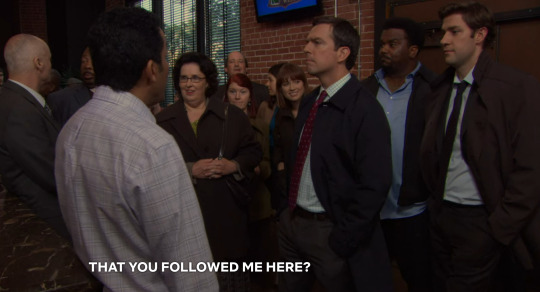
WHAT INDEED OSCAR
WHAT. INDEED.
(The Office 8x11)
Bonus:
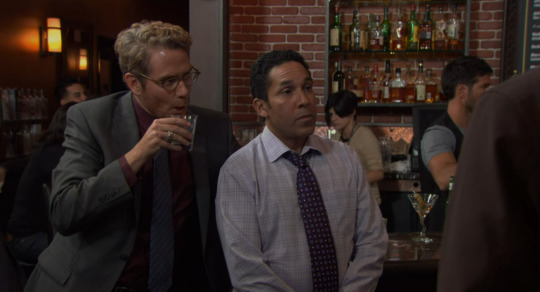
He gets it.
#say it again but slowly#not me taking this completely out of context for my own demise#andy bernard#oscar martinez#spannard#the office#these episodes are taking a toll on me I swear#I cannot handle so much hinting
22 notes
·
View notes
Text
My roommate asked me, in Star Wars terms, what "episode" the first Zelda would be
This of course led to a 45-minute lecture about how the Zelda timeline is structured
The answer I ended up giving him is that it's the Fallen Hero equivalent of Rise of Skywalker, down to "somehow Ganon has returned", but I also came to a realization within my lecture
Back when Skyward Sword came out, I heard some heated discussion about how when the Hero of the Sky went back in time to defeat Demise before the events of Skyward Sword could occur, erasing him from existence rather than sealing him to become The Imprisoned, a new branch in the timeline should have been created the same way that it was when the Hero of Time returned to his own era and prevented Ganondorf's theft of the Triforce of Power
Given that we've now seen in Tears of the Kingdom that the Kingdom of Hyrule was founded by the union of the Zonai and Hylians rather than the people of Skyloft, is it possible that the Zonai either came into being or were prevented from going extinct because of Demise's defeat? The Sheikah are near nonexistent in the time of Skyward Sword, but the younger Impa that guides Zelda is from the past - from Demise's time, so did Demise's defeat allow for the Sheikah to flourish and create technology based on what ended up being left behind by the Zonai?
It seems like a common belief at this point that all of the other Zelda games are quite literally the "Legends" of Zelda in the context of Breath and Tears, that they're folktales rather than history, but if there's a way for them to still be connected to the rest of the timeline, I'll take a convoluted and fun explanation over one that completely divorces itself from the rest of the series entirely
#legend of zelda#breath of the wild#tears of the kingdom#zelda timeline#the legend of zelda#loz#tloz#zelda#zelda headcanons
46 notes
·
View notes
Text
WIP WEDNESDAY
thank you for the tag @honeybee-bard <3
tags for @lemonsrosesandlavender @faetouchedfool @scandistar if you want to share anything <3
mandatory yap time:
today i've been ignoring my responsibilities and been hacking away at the draft for next chapter of you keep showing up.
my fingers are itching to share some of it so i'm just gonna do it.
the smug bastard is back in the fucking building again.
fret not, i have not given up on bullying him. he's just getting a break.
and please don't come for me at my complete lack of knowledge on how to play chess.
out of context this whole thing might not make any sense, but it will. i hope.
this is quite spoilery so read at own risk.
let's go!
Raphael has, with almost full certainty, come to the conclusion that the little mouse isn’t playing any games with him at all, especially not after watching the mental fistfight going on behind her eyes when she made her completely uncalculated move on him.
He could practically smell the arousal, it had been straight up delicious.
And desire, that’s just one of his specialities.
It’s his turn to be the spider in the web now. She’s still unpredictable, of course, a creature of instinct. As much can be gathered from the moves she makes on the lanceboard. She barges head first into every trap he sets for her and then mumbles foul curses as he strikes.
But, he can work with this. He’ll be careful, if he pushes too hard she might shut him out. But just enough, and he’ll have her wrapped around his finger in no time. Then, he’ll… Well, he’ll figure that part out later.
She chews on her lower lip as she watches the board. If his calculations are correct, which of course they are, he’ll have the little mouse in checkmate within five or less moves. He’d have to get almost stupidly sloppy if the little mouse is to take any of his important pieces.
The little mouse’s shoulders slump more and more with every one of her pieces he collects, part of him almost wants to take pity on the woman, now running her hands though her hair.
“You never got the chance to answer my question before,” he says, the little mouse doesn’t look up from the board. “What other thorns does this rose have?”
“Can’t play lanceboard,” she says, moving her only remaining tower and taking one of his pawns, looking up at him with a confident smile, as if his knight won’t take it out in a couple of seconds. “Can’t play any instrument either.”
“No?” Raphael says, eyes set on the little mouse as he strikes on the board. “I would assume that would be a part of a noble upbringing like yours.”
“You’ve done your homework.”
“I research my investments.”
“Waste of time.”
Raphael chuckles.
“In your case, my dear, very much so.”
“As is this game,” the little mouse mutters, the reality of her demise growing clearer to her as he sets up for his final blow.
“A game between friends and stimulating conversation.” Raphael says, arms spread wide to emphasise his point. “I must argue that your idea of time wasted does not match mine.”
“You wouldn’t do this unless you got something out of it,” the little mouse says, giving him a pointing look.
“And what, mouse, am I getting out of this?” he asks, voice low and rumbling.
The little mouse swallows, before worrying her lip between her teeth. Steady now.
“Something you want, I assume,” she says.
“And you don’t believe it could be mutually beneficial?”
“It could be.”
8 notes
·
View notes
Text

Dreams tell you a lot about a character's mental state.
Pomni right now, is dreaming about her own demise.
First of all, this is why Digital Circus isn't episodic. Episodic is when the entire world resets in the next episode and the events of the previous don't matter at all. Family Guy is episodic. The Simpsons is episodic. Totally Spies is episodic. Looney Toones is episodic. You can jump into ANY episode you want, and you get full context of what you need to know and you're not lost.
But Digital Circus? If you jump into Episode 2 without seeing the pilot? YOU WILL BE CONFUSED AS S#%T.
You'll be jumping into a random jester girl you don't know dreaming about her own demise! With no context of the Pilot events, you'd scratch your head and go "What is happening right now??"
That's my proof that the show is a HYBRID format, not an episodic format.
Anyway this is where I put a trigger warning for discussions about suicidal thoughts.
So Pomni dreaming about her own demise here is... VERY ACCURATE.
You might not know this, we don't talk about it for a reason on how personal it is, and I will still leave details out for the sake of privacy.
But both me and my GF have had these exact sort of mental health problems at several points in our lives.
Where we've each had episodes where we thought "Life is meaningless, there's no reason to live, there's no reason to be a part in this cruel world."
For the sake of privacy, I'm not gonna reveal any further details about my GF's side of it.
So I'll stick to mine.
For some people, they think that depression immediately snaps to suicidal thoughts and that's what depression means.
It's not.
They're two separate things.
For example, the only time I ever thought about doing the need was as a teenager and being forced to wear braces. Yes, I told myself I'd rather die than have braces. My crooked smile was something of my identity to me, and every adult wanted to take it away. Seeing other people in school with braces SCARED me and made me feel hopeless and unsafe.
BUT, NOT EVERY PERSON WITH DEPRESSION WANTS TO DIE.
Pomni is an example here. In this dream, she's screaming "No!" she's screaming "Help Me!" She DOES NOT want to end up abstracted.
But she still thinks this is inevitable and this is what will happen to her.
In this dream, she considers herself so weak minded and so WORTHLESS that she'd abstract easily and in a heartbeat.
I've had nightmares like that all the time. And even DAYDREAMS of these things. Of a tornado coming by my place and I'm swept away in it like in Twisters. Of getting run over by a car at work. Of a plane ride going wrong and dying in a plane crash. Of people barging in with guns and killing me for one reason or another.

And in ALL these dream instances, they contained of my own loved ones being either upset with me that I died, disappointed in me that I died, or I'm simply considered "A Casualty" and that's the extent of my entire life, and in time I'm completely forgotten about.
That DOESN'T mean the person WANTS to die. They are still dreaming about their own demise and it's concerning and needs to be looked into.
Just because the person isn't actively trying to die doesn't mean they don't have those thoughts in their head.
Depression isn't 'a long term period of sadness', like many assume without research.
Depression is the lowering and numbness of a person's mood which makes their emotions become numb and hard to feel properly. They lose interest in the things around them. They lose pleasure in the things they once loved seeing or doing. Many people with depression experience stress and anxiety during the harder times in their life.
So yes, by definition, Pomni DOES struggle with depression.
And this nightmare is solid proof that this is what is going on with her.
Her dreaming about her own demise, and about how no one would care and no one would remember her, is SO REAL to me.
The trailer barely showed any of this context, as it shouldn't it's a trailer. We knew Pomni was gonna dream about abstracting, but we didn't know WHY it was. For most of the episode's advertising, it was "CANDY THEMED MONSTER TRUCK ACTION FLICK! YAAAYYY!!!"
And then Gooseworx made that comment that Episode 2 is about depression.
And I reaction was "Uuuuuhhhh... what?"
I thought it would be portrayed as the common way media portrays it. But THEN, it ended up being one of the most ACCURATE and one of the most AWARE and one of the most SOOTHING portrayals of the subject I've seen in cartoons.
I already said this episode helped me get help with my depression. That doesn't mean I was immediately cured, that's not how that works, but watching this episode made me feel HEARD and also helped me see that there WAS some meaning to life.
So yes, from my own experiences and my own research and understanding, this episode's subject matter was very well handled.
#the amazing digital circus#amazing digital circus#digital circus#tadc pomni#tw depressing thoughts#tw depression#tw suicidal thoughts#tw discussion of suicide
3 notes
·
View notes
Text

There was several groups of people hate-following her, both alt-right and liberal, collecting everything she said online and attempting to smear campaign her, by taking everything out of context. They finally succeeded when she made a completely innocent tweet about the 'Reya and the Last Dragon' movie, comparing it to Avatar the last Airbender, which is a comparison everyone else made as well. However It escalated on twitter to the point where she was called racist against asian people and even responsible for death of asian women, which was a viral hate-crime event at the time.
People specifically interested in cancelling her then compiled all of her perceived 'crimes', which were all tiny transgressions, something a m*n would never even be held accountable for, and also very normal and common for the time period she had been doing it. Pretty much everyone did the same stuff but only she was decided to be singled out and attacked for it. People harassed and abused her online until she deleted her Twitter account. She then made a now-unlisted video called 'Mask Off'. In the video, she explained exactly what happened, and then went on to explain, acknowledge and apologize all of the micro transgressions she was attacked for, and she did it with so much nuance and grace, I still admire her for it. She also came out about her experience being drugged and raped, because it tied in to something people were coming after her for. I didn't see it happen, but I can only assume that knowing this information, people went on to try to trigger her about all personal information that came out in that video, because little after that, she posted her last video on youtube.
There was significant glee and very blatant proclamations that they'll come after Jenny Nicholson next, and SarahZ next, as they were both significant and almost equally popular female youtube figures at the time. It was obvious that women did absolutely nothing to deserve that, and people intentionally wanted to take influential women down from the platform. Neither SarahZ nor Jenny Nicholson have posted as many videos since then, and their public content has become significantly rare, in order to protect themselves against the same trauma that was bestowed upon Lindsay.
I believe this is the same reason illuminaughtii is currently getting cancelled, the accusations about her are basically "she's not a completely perfect person" and it's not supported by any concrete evidence, only stuff like 'she was mean to a male once'. I've never followed her so it didn't impact me directly, but I hate it, she was also making intellectual content and she has the right to keep doing it. Males are doing thousand times worse shit left and right and getting a pass.
Thank you so much @sapphic-schizo for alerting me that Lindsay put up a new video! I never saw it in my feed even though I'm subscribed, I can't wait to see it, I just want to see how she's doing.
Also, I got another comment saying it was 'libfems' who participated in harassment of Lindsay, but I don't see how that makes any difference to what was happening, I find that argument is merely derailing the topic. If women stand with m*n and fight their battles, that's still misogyny. If we're looking at every act of misogyny and asking ourselves 'well did some women participate in it too?' as an attempt to blame the women for it, we're stopping the discussion there, we can no longer hold m*n accountable, because oh well, some women did it too.
Instead what we should be asking, is who benefits from it. Women were standing with m*n and fighting their battles trough all of the history, it was like that with women's right to vote, to work, to own property, to own a bank account. But women had no benefit from it. They were working towards their own demise. Women also had no benefit from Lindsay being harassed off the platform, and other influential creators being threatened with it. That benefited m*n only. We can point fingers at them.
I've been missing some of my favourite women on youtube; they either post extremely rarely, or are completely off the platform, like Lindsay Ellis. After the brutal and misogynistic treatment of Lindsay, I noticed the amount of long video essays by women lessened, as I expected it to. SarahZ was posting less too, Jenny Nicholson's videos became a rarity, and some creators publicly commented about how debilitating it was to create while knowing they will be attacked from every angle, by m*n who were enraged that women are saying things online. I thought women became too stressed and afraid to create, until I realized they simply moved into the private sphere. Nebula and Patreon, there they would have a very limited, paying audience who was safe for them, and they wouldn't be exposed to this level of harassment, as their content is not free anymore.
I think it was a great move by all of them, to move where it's safe for them to create and make a living out of it, but it showed me that women are still only allowed to exist in private. Women are chased away from the public sphere brutally, and they have to create private spaces to be able to talk. M*n, on the other hand, are still freely making long video essays using next to no braincells and adding so much misogyny and male stupidity into it, that it's unwacthable. But they get to do it, they get to be paid for it, publicly, with maybe a tiny percentage of harassment women suffer. They get to shower the public with mediocre, unfunny, dumbed down, sexist and gross content and nobody will do a thing about it. Meanwhile women creating engaging, funny, educational, insightful, extremely well researched and presented content, will be exposed to hatred that will shut them down, and move them into private spaces.
It made me so mad, and so helpless to think about this, and I concluded that in response to this insanity, we should be allowed to disband the males. And by this I mean, we should get to close down every male-made public institution and organization. We should get to shut down male governments, we should get to shut down male wars, corporations, mafia, pornography and human trafficking rings, studios, companies, stores, it should all be made illegal overnight, defunded, disbanded, and shut down instantly. That would be equality because clearly they can and do it to us constantly. And we'd make a new system so fast anyway, and it would have so much less stupidity, so much less murder, it would be freaking incredible. And they'd be mad because in the new system, they would no longer be able to rape and murder as much, there would be less wars so they don't get to go and steal resources and human lives anymore, they wouldn't be able to get brainrot of pornography, boo. They created a system that doesn't even do them any good, it just makes them sick. It should all go down. Fuck their shit. We should get to rule everything. And youtube should be female-only. M*n can talk in private.
324 notes
·
View notes
Note
I know Zelda lore is generally complicated and all, but if you know of the manga (it is a prequel to Skyward Sword and considered a origin story of sorts) what are your thoughts on Hylia and Demise? and the chosen hero aka The First Link?
Some would interpret it as more of a origin story of hylian legend, so like something that is more biased and very different than the true historical happenings of an ancient era, so shrouded in legends very much.
IMO Zelda lore is also immensely take-it-or-leave-it. I've always been a bit lukewarm on The Great Zelda Timeline, since I feel like it's more logistical to think of the games as effectively self-contained AUs of each other with a few threads of continuity that can give context.
I'll also say that I know little of the various manga adaptations, but the skyward sword manga in particular doesn't really appeal to me; I know enough of it to not particularly want to know more. I’m not a fan of its version of Hylia being almost exactly like Zelda, especially when canonical details in Skyward Sword imply Hylia was not really humanlike at all- the “feathers” from her wings look more like chunks of crystal shrapnel.
I've got my own headcanons / reads into that gap, which are- much like canon- completely take-it-or-leave it, but I think they’re fun. I will put those down under a cut, here, because they get long.
So my major read on the events predating Skyward Sword, and thus predating "everything" in the Zelda mythos, is that the golden gods are effectively the big bang. Nothing 'as we know it' exists before them, everything 'as we know it' exists after them. For a while, they overlap with their creations; this is where their names and predilections become known to a degree. Thus, there's a kind of dynasty of gods- the first dynasty being Din/Nayru/Farore.
This ultimately ends in the creation of the triforce- the point where the gods exited the world. Eldritch artifact, basically a hole in reality that leaks infinite primal potential. Simultaneous evidence that "the throne" is empty, and the tools of creation used to shape the world.
A take I have at this point is that both Hylia and Demise are worshiped like gods, but they're basically powerful natural spirits. But they're kind of major contenders, and begin fighting each other over the Triforce. Hylia has her supporters and creations, Demise has his, and they’re both, IMO, flawed.
Hylia is calculating. This is basically textual in Skyward Sword- she appears to value leaving as little as possible up to chance (hence Fi as a guide to Link, who seems to have been trained to disregard her own emotions as much as possible) and by the works she leaves behind alone, she verges on pretty heartless- the entire Lanayru Mine society consists of sapient robots who are clearly people, and cherished by the Thunder Dragon and vice versa, and, um... are obviously dying and collapsing into an inevitable disrepair they are, a certain degree aware of. Skipper does not even leave his duty to try and go home using the borrowed time the Timeshift stones give him so that he can be with his family when that borrowed time runs out... and it does, because we never see those guys in any “future” game.
Basically, Hylia values order, but not autonomy. If she has her way, it will never even occur to you to contradict her or speak against her. She cares, but her model of caring is irreconcilable with human free will or determination. She’s seen as the benefactor of the hylians, who took their names in her honor, but Skyloft from what we see of it is a little less like a sanctuary and a little more like the Human Zoo from Steven Universe- especially down to that it was used to cultivate Link and Zelda. The Loftwings are even ostensibly divine forces that specifically observe and manage each denizen.
Fi is arranged to self-terminate so she won’t contaminate anything other than her objective. Zelda is given the ability to realize Hylia’s goals at a key point such that if she has an attack of self-loathing on recognizing Hylia’s memories, this, too, serves her larger game plan- it in fact works better if Zelda doesn’t want to be Zelda right then, because she’s just gotten Hylia’s memories uploaded into her real hard. (We’ll get back to Zelda)
Meanwhile, Demise enjoys freedom, but not in a way that really seems to respect people. Ghirahim, compared to Fi, is wildly unfettered; left to his own devices, to pursue his own interests and opinions. He’s free. And Demise crushes him.
Likewise, when talking to Link, Demise is polite, even charmingly sporting. Unlike any other Zelda boss before or since, he textually in-universe suggests that you should prepare as best as you can and take as much time as you need, while agreeing to wait in one specific location. In polar contrast to Hylia, he clearly does not have a grand divine plan. He intends to strip Link down by force exactly the way he did Ghirahim, but he won’t enjoy it if he doesn’t give Link the chance to waste all of Ghirahim’s hard work stalling and forcing Link to a standstill. Demise wants Link to be as gorged up with freedom and power as possible... so that he can be the greater force and shatter it.
This factors in to their metatextual successors, Zelda and Ganondorf. Zelda is anticipated, cultivated, and extremely controlled. Even at the extreme endpoint of the timeline as we’re aware of it, Zelda is invoking Hylia for power. This, logically, shouldn’t be the case- Hylia is completely terminated. Anything that Hylia had, is now Zelda’s, via birthright and the ritual that awakened Skyward Sword Zelda, the very first one. Zelda’s a divine-blooded demigod; she ‘honestly’ comes by all the power she must need.
But Hylia never really meant Zelda to be a worthy successor; simply a Favored Heir, who, for her favoritism, has the best prize Hylia gives all of her most important servants: the prize of being completely preordained. Known. Controlled. Nayru seems to be the “natural” god of time given Oracle of Ages; but Hylia seems to position herself as a conqueror of time. She viewed Zelda as an extension of herself; simply a continuation who would behave in certain, useful ways- human ways, sentimental ways, that are inaccessible to Hylia herself, to love Link and be loved by him- and then when the time is right she wakes up and knows all of her instructions and will act perfectly, because you were Hylia all along.
Conversely Ganondorf pretty obviously hates the gods period, no exception, no “your god’s worse than my god”. He wants things to be his and his alone. He’s not even a favored son to Demise’s curse, if we are supposed to believe- as seems to be the implication- that said curse is responsible for every Zelda antagonist that is a blight to Hyrule; there are plenty that have zero connection to Ganondorf, and it suggests Demise’s Incarnation is a concept that abandons Ganondorf, regularly even. If there’s anything Ganondorf has from Demise, it’s things like the title of demon king, that seems to be Ganondorf’s own efforts that pull him over the gap.
The one time Ganondorf succeeds by the obvious assistance of a higher power, it is when the Triforce of Power intervenes on his behalf in Twilight Princess, and in the same game, we see Ganondorf desecrate and behead the statues of the Triforce Goddesses in Hyrule Castle’s throne room.
So- getting back to Skyward Sword and the god war.
Hylia claims she was entrusted directly with the triforce. We hear this claim through the story told by her subordinates. It seems to line up with that Ghirahim- the chattiest member of Demise’s forces by virtue of being last man standing for most of the game- makes it clear Hylia’s incarnation is his biggest problem to resurrecting Demise.
But, there’s a couple of threads to spot in this narrative, and those are the things that make me think Link’s position is complicated, both regarding the triforce and otherwise.
Hylia cannot use the triforce. This is explicit. If it was truly given to her for keeping, she’s at bare minimum using bad faith workarounds of instructions she was given or parameters set on her. We don’t have Impa as an entity informed of the war who understands and agrees with Hylia make the wish on her behalf; instead a hero is cultivated. Link is a trap for the triforce.
And Link is obviously cultivated. He’s marked from birth by the Red Loftwing. Zelda’s speech when Link finally catches up to her and she gains Hylia’s memories have her outright say that Hylia used Link. That Zelda’s existence is a trap for Link.
Now... to me, I feel like this has fascinating context for the fact that Link and Zelda have this omnipresent yet often stilted relationship. Almost every game ends with the implication Link and Zelda are together now, a couple now; games that give him over love interests tend to come with this obvious subtext of “but you’ll leave her to be with Zelda, right? Or if you won’t be with Zelda, you won’t be with anyone,” and even in isolation, in Majora’s Mask, the Song of Time taught by Zelda and the Ocarina of Time given by her are the most essential thing in-game to proceed.
But also, there’s a bunch of times Link either optionally or explicitly tried to be in a relationship with someone else? In Skyward Sword you can flirt with Peatrice and while the game clearly insinuates this is a fake, ‘mean’ relationship unlike Link’s devotion to Zelda, it never out and says it. Link could be totally serious. He definitely was serious in Breath of the Wild, where Mipha’s working on their engagement rings, which no unserious couple would be talking about, and the wedding’s only called off on account of the bride’s abrupt death... which her kin even take out poorly on Link.
I don’t mean this as an anti-zelink screed, but I think it’s interesting to me- and really morbid- that Link and Zelda are implied in Skyward Sword to be cosmically ordained star-crossed soulmates. Link is destined to be Zelda’s symbolic groom, but also, their happiness and union are actually optional. The real thing that’s mandated, that Hylia counted on, was Link loving Zelda and despairing at losing her. Link, running after Zelda into certain danger. Link, loving Zelda, and Zelda being loved by Link, as a trap.
This is the main way I diverge from the manga’s take of Hylia and the zeroth hero as lovers- because I feel like the fact that Hylia, who herself does not seem to value emotion directly (less than Demise, who deliberately wants to get an emotional response out of you) is so concerned that Link must love Zelda, that he must know and chase Zelda, that Hylia’s will has to be distant to him...
Implies Hylia was perhaps scared of Link. Which is silly; she’s a goddess and he was not even really destined yet. She was scared of a hypothetical person she was molding into a template, or if ‘scared’ isn’t the right term, she was concerned that something might. go wrong. with Link, if she started selecting people for these qualities.
As if, perhaps, from the original person Hylia was seeking to cultivate again, there were actually qualities about the zeroth hero that Hylia didn’t like very much. That the zeroth hero may have been strong, and brave, and deserving of the title of hero... but did not love Hylia, and was not devoted to her.
The zeroth hero also seems vanished from Skyloft’s history. Only Hylia is stated to have saved them.
But things come in threes in this franchise, even if one of the three is disgraced or hidden.
If Zelda is Hylia’s favored heir, whether or not she wants this and often explicitly not wanting this, and Ganondorf is Demise’s (figurative) discarded bastard whose frustration and ambition allow the parent to parasite off of him from beyond an absolute grave...
What is Link?
Let’s talk about Majora’s Mask.
A friend of mine exposed me to the notion that Majora’s Mask is kind of a dying-dream game; that it takes place overwhelmingly within Link’s mind. Actually looking at the imagery and word choice used by this game, and how many characters inexplicably repeat (Cremia and Romani’s unnatural resemblance to Malon; Koume and Kotake as benevolent NPCs who seem to never acknowledge their previous run-in with Link; Ganondorf’s face leering down from the moon), this would seem to make sense.
Especially the Happy Mask Salesman, who as textually as the game can get, is functionally a psychopomp and definitely has some kind of agenda that makes him very pushy towards Link, but in a way that feels distinct from any other character nudging you into a quest.
Majora’s Mask seems to be illuminating the death of the Hero of Time, not the first Link but the ‘ur’-Link that out-of-universe came to define modern Link. There are two major, powerful figures in this game, one that’s omnipresent and the other that is much more enigmatic and missable.
The first is Majora. We are introduced to Majora only through its death mask. Implicitly, like Darmani and Mikau and the Deku Butler’s Son, Majora is dead. Majora is also immensely powerful, and was used by others to curse their enemies.
Unable to rest or be at peace, Majora has tumbled through time. Its current host is Skull Kid, an innocent child from the woods who was driven by loneliness. Skull Kid has fairy companions, and also, feels that he was abandoned by his friends, because they departed to the corners of the world to become divine pillars protecting from harm. They are only reunited in event of catastrophe.
All of these things are traits of Ocarina of Time Link, actually. He was also, originally, a child from the woods; we can figure he was almost definitely lonely when everyone in his society had a fairy except him, when he was actually a hylian among kokiri and lacked words to articulate why he felt unlike others; Saria was kind to him but most others are at best indifferent and at worst, Mido. Much is made in OoT that he cannot be with Saria and this becomes true no matter where he goes; he can’t be with Ruto, or Darunia, or Impa, or Nabooru, or Rauru. Just about anyone who’s notably kind to him perishes or ascends to become a sage. He is not like them.
And Link is told that there is this specialness, this thing that is beyond him and older than him, but it becomes core to his identity until after a while it’s the only thing anyone sees: the role of the Hero.
“But Clockie,” you might say, “the hero is a good thing, and Majora was used to curse others!”
To which I say: in Wind Waker, The Soul of The Hero is explicitly and repeatedly tied to the wind. His legend survives ‘on the wind’s breath’. Link is given a powerful royal artifact, that the king of Hyrule used to command the wind.
And at the very end of Wind Waker, Ganondorf talks about the wind. He lays it out as plainly as possible that part of what he coveted in Hyrule was that the wind favored it. The winds over Hyrule bring it peace and prosperity. That same wind, over Ganondorf’s world, brings death and destruction. This is... never argued with. In fact, at the very end of Wind Waker, as Ganondorf lays dying at the hands of the hero yet again, he cracks a bitter smirk and says that the wind is blowing.
To the civilization that profited from Majora’s Mask, it probably seemed like a blessing until it became impossible to contain. While we never hear about the hero going rogue or turning on the people around him, it is notable that Wind Waker’s incarnation of the hero’s myth in particular features people cursing the hero’s absence. Just like with Majora, the prosperity given by the Hero fails.
It’s also notable that as a villain, Skull Kid seems to do an awful lot of sidequests, doesn’t he? He messes with others’ trivial affairs quite a bit.
So, I think that Majora, in Majora’s Mask, is almost a form of Dark Link- he embodies things Link fears about himself and the hero’s role.
And then there’s the other entity- the Fierce Deity.
The Fierce Deity, unlike Majora, is completely erased from history. We do not know who or what they are.
We know that they are dead, because they’re a mask.
We know Link only gains access to them if he faces the questions of the moon children- questions that seem to be interrogating both Link’s feelings, and the nature of the Hero, but one in particular involves asking Link if that’s really his face.
The Fierce Deity is otherwise never seen in Hyrule’s pantheon. Their fallen regalia surfaces on rare occasions.
They are stated to have overwhelming dark power, and seem only willing to manifest through the mask to fight a great enemy. And unlike any other spirit Link connects with in Majora’s Mask, they never speak.
The mask has an uncanny resemblance to Link.
I think that Majora’s Mask is a point where Link is accessing his precursor.
I think that in the original god war, there was a third contender.
Hylia, Demise, and Majora.
Majora, the Fierce Deity, presenting as neither a goddess nor a demon king, an entity that aligned themselves with mortals and brought prosperity and security to them. A creature of dark power, who nonetheless became known as a Hero.
At some point during the war, Majora aligned themselves with Hylia. They may have had their own designs on the triforce. They may have seen her as the lesser of two evils. After all, compared to Demise, Hylia just wants to control people; she doesn’t want to crush them.
But the key distinction here is, Majora did not love Hylia. If they may have, they did not let this stop them from seeing her as almost as much of a problem as Demise. They would bring her prosperity, but only up to a point. Then, they would part ways.
Majora faces Demise. Demise is pleased to have an opponent, and facilitates Majora, perhaps far more than he should have.
Demise crushes Majora, but not without sustaining serious injuries.
Majora dies; mortals and smaller spirits grieve the loss of their hero. A death mask may or may not be forged in their likeness.
The stalemate is broken; a weakened Demise is no match for Hylia. She embeds him in the sealed grounds, and becomes the decisive victor and remaining survivor. The die is cast; from this point onward, the existence of Hyrule as the dominant land and the worship of the golden gods becoming synonymous with the worship of Hylia has its foundations here.
But Demise isn’t gone; he’s a god. He’s a little hard to kill, if he wants to stick around. And Majora does not want to stick around; and forcing them to will almost certainly exacerbate their connection.
If only, Hylia thinks, there was a useful way to contain all that was important about Majora- their valor and great strength- in a form that was more pliant. She has worshippers. She has the mortal entities that Majora once cared for.
That’s right. Majora cares about mortals, don’t they? They fought to save and protect others. A Majora who doesn’t remember that they lived wild and disobedient, a Majora whose uncanny power of twilight is tempered and weakened, a Majora who grew up among Hylia’s chosen people so as to carefully control who he gets attached to, and to ensure among those attachments, there is a friend- a dear friend, a beloved friend- who he will fight to stay close to, no matter what.
Who is not the entity that they once distrusted, but who will, predictably and perfectly, act as a continuation of that entity’s will, and because her love is real, she will be so, so sorry about it, and hurting so much, that it’s impossible he would ever betray her.
How many times is Link in essence, told to wake up, often by a manifestation of Zelda?
#Legend of Zelda#readmore#tl;dr hot take#Zelda is the demigod Incarnation of a lovecraftian deep one#who did not understand that in creating Zelda she was creating an entity separate from herself#and thus arranged everything to expect Zelda to continue to carry on Hylia's Perfect Work forever#Ganondorf is the bearer of Demise's curse that he was not born into but caught like a parasite and it chews on him#and because he is That Motherfucker; Bespoke And Inimitable#Ganondorf has made an entire career out of stealing Demise's shit in response without even fully being able to know who and what Demise was#because Demise is dead#LINK THOUGH. Link is possessed#Link is a Nice Young Lad who is super turbo possessed by a half-conscious entity#who was betrayed and trapped to be here#and it's super fucking pissed but there's not enough of it there to fully assert most of the time#this nice reasonable young man has a well in his soul that goes straight to the core of the earth and the screams of the damned wrathful god#echo all the way up
148 notes
·
View notes
Text
Possible JAWS parallels for Vecna’s end + Mike fake-out death
Ever since I posted my analysis on the JAWS poster motif in ST—with JAWS representing Vecna, the placement of the poster in Will’s rooms during Byler heart-to-hearts, and it showing just how much Mike in particular is being targeted by Vecna—I’ve been thinking a lot about the last ten minutes of the film. Specifically, I’ve been thinking about how the film ends on Hooper and Brody.
Hooper, the oceanographer who discovered with Brody just how much of a threat Amity was under because of the monster shark (and goes out to sea with Brody and Quint as a means to put an end to it), enters the water in a shark-proof cage to lethally inject the shark via hypodermic spear.

The shark rams the cage, Hooper drops the spear, and it falls to the seabed.


The shark bends the bars and pushes its head into the cage, trashing it in an attempt to kill Hooper. Hooper fights back—

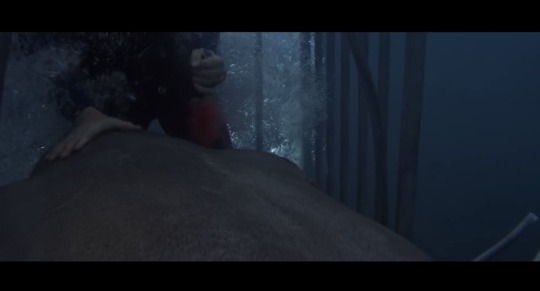
—and manages to slip past the shark while it thrashes around in the cage’s remains. Hooper swims down to a rock formation on the seabed and hides there.
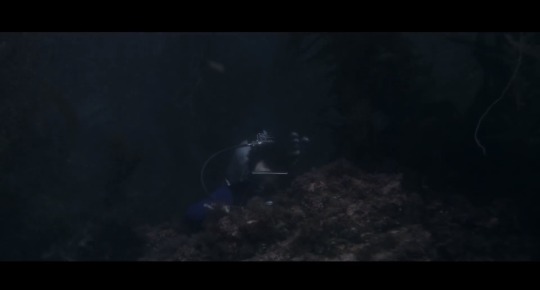
Cut to when Brody, atop the sinking Orca, utters the famous line “Smile you son of a bitch!” and shoots at the shark, hitting the tank in its mouth and blowing it up.


He did it. Finally. Brody defeated the shark. There’s relief and triumph in his laughter as the mangled corpse sinks amid its blood. As the shark sinks, so does the victory in Brody’s face. Adrenaline is calming. He’s likely processing everything that’s happened while thinking he’s the only one left out there on the water.
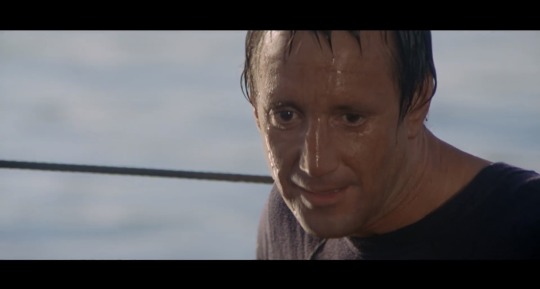
But Hooper surfaces. He’s alive, unharmed, and he swims over to Brody. The two, completely exhausted from the fight they just endured and overcame, share laughter. As in, yeah, we survived that.

Since Worlds Turned Upside Down mentions “the Duffers often cited the villainous shark as a key inspiration for the monster haunting Hawkins,” and that JAWS is also “the Duffer brothers’ favorite film,” I am entertaining the possibility that Vecna’s eventual demise could resemble the shark’s. AND this includes a fake-out death for Mike (Hooper) as well as Will (Brody) being the one to ultimately kill Vecna while thinking Mike is dead before he ‘comes back to life.’ There could be scenes paralleling Hooper and Brody during the fight and in the aftermath. For Will and Mike of course, everything would have its own details that fit for them and I can’t imagine it not being crazy emotional. Mike being attacked, fighting back with all he has within a literal grasp of death, ‘dies’ but is actually okay, Will doesn’t know it, Will has an insane final confrontation with Vecna before he kills him, Will thinks he’s alone… but there Mike is. Coming back to him.
The catharsis of it all would be so unreal. I can’t even fully imagine it myself.
Also. I can’t not think of the fact that the final battle in JAWS takes place in the water. Most of the movie takes place around or in the ocean, so it’s a given. But in context with all the water references/imagery/motifs in ST and negative associations with it (many relating to some kind of conformity or death), it has me wondering about how the final battle in ST might look despite there being no water in the UD. I do keep thinking about the quarry though… and the void…
#just thoughts#there’s so many to consider#not a literal play-by-play of jaws#just certain details or callbacks that are familiar#jawsgate#jaws motif#mike fake-out death#will kills vecna#maybe not with a gun but he’s killing him#I still think so#and no I don’t want to think about quint’s death meaning anything rn#byler theory#byler speculation#byler#st5#st theory#st water motifs#watergate#st void
40 notes
·
View notes
Text
On Awakenings in The Legend of Zelda, Part 4: Why Can't Fi Just Talk in BotW?

On Awakenings in The Legend of Zelda Part 3 established evidence that Fi can no longer talk to people at all on her own - and people have to meet specific requirements in order to talk to her: they must have their own magic and they must be fully aligned with the Triforce of Courage. Up next:
Why Can't Fi Just Talk?
1.) The first clue comes from Skyward Sword's ending.
At the end of Skyward Sword, Fi tells Link he must return the Master Sword to its pedestal. Here's some important dialogue from Fi: - "Master Link, you have successfully protected the Goddess reborn and defeated Demise, fulfilling your role... My purpose here is complete." - "Drive the sword into the pedestal before you, and I will return to the sword to enter a sleep without end." - "...at the end of my journey with you, as I prepare to sleep within the Master Sword forever..."
She hopes they'll meet again in another life, but says her sleep is without end. Hmm.
Here's my interpretation: Hylia created Fi specifically for this mission. Once it's over, she powers down. Whatever energy she had that allowed her to manifest physically and be heard by others will be gone. It's not clear to me precisely what this energy is, but it is clear Fi knows she won't come back out. She'll 'sleep' forever.
The punchline: Fi changed permanently at the end of Skyward Sword--she is 'asleep.'
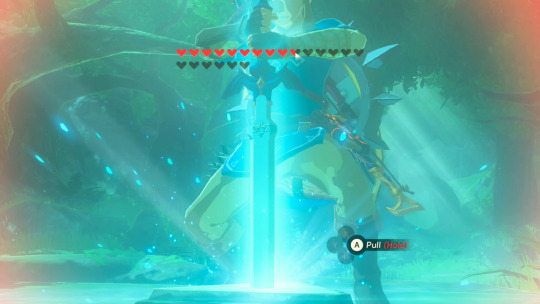
2.) Link must expend his own life force to pull the sword from its pedestal in BotW.
The Deku Tree warns Link that if he tries to pull the Master Sword in any kind of weakened state, he will lose his life where he stands.
Wow.
...Why?!
Link needs 13 hearts or more to pull the sword from the pedestal. Link's life energy drains as he pulls it out.
I highly doubt either Hylia or Fi think it's fun or necessary to play chicken with the life of the chosen hero. It's much more likely they have no choice.
If Hylia meant for the Master Sword only to be used for one mission and then powered down, what's left to power it? What can allow it to perform its magical wonders? What can provide the magical energy to allow Fi to be heard?
The answer seems simple: Link can. Link is magical.
In BotW, he gains 'spirit orbs' from monks, spiritual energy Hylia can convert into life force or stamina. I think you can interpret the expenditure of this energy as being required to activate the sword.
The punchline: It takes energy to activate the Master Sword in BotW.
3.) The Master Sword requires magical artifacts to be pulled in other games.
Is there any other evidence for the energy punchline above? Yes!
In Ocarina of Time, A Link to the Past, and A Link Between Worlds, Link can't pull the Master Sword unless he has three other objects. In OoT, they're the spiritual stones. In ALTTP, they're the pendants of power, wisdom, and courage. In ALBW, they're the pendants of virtue.
Granted, this is a story device to get you to take Link to the three overworld dungeons in each game. However, Nintendo put them there, so they're canon--and they're presented as powerful magical artifacts. In the case of OoT, they're meant to be part of the seal to the Door of Time. In the other two games, they're not! They're just... required to pull the sword. Without them, Link can't do it.
So, what's their purpose?
In context with BotW, it's easy to argue their magical energy is expended instead of Link's life. In both cases, without extra magical energy from somewhere, Link's going to be under 13 hearts and he'll either die or fail to pull the sword.
This doesn't happen in Twilight Princess, but it's the only game in which Link already has the Triforce of Courage when he pulls the sword! I can easily believe the Triforce of Courage provides the needed energy. (This is a whole other post, too, for later).
The punchline: After Skyward Sword, Link always needs something magical to pull the master sword, even if the magic comes from Link himself.
What about the Oracle games or Zelda 1? The Oracles' 'master sword' is not the true sword--it's the noble sword with a power upgrade. In Zelda 1... if you take the 'white sword' to be the Master Sword (with its name forgotten), the sword is lying in a grave. Three guesses whose. It doesn't have to be pulled. The situation is different.
4.) Link is canonically magical, with or without the Master Sword.
Link can perform his clearly-magical spin attack (it fires energy outside the reach of the sword) no matter what sword he's wielding. That magic must be coming from Link himself--not his sword.
Link's cool bullet-time/flurry-rush abilities in BotW are intrinsically his. He doesn't need any magical objects or power-ups in order to use them.
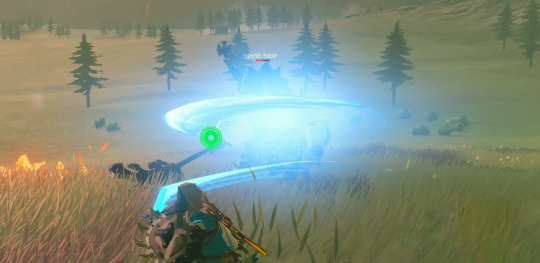
Link fires a long-range sword beam from the Master Sword at a Lynel.
The screenshot shows a subtle example of Link's own magic. The Master Sword can only fire its signature long-range energy beam if Link is at full hearts. There's no reason for this to matter unless the magic's coming from Link himself. (It's like the sword won't automatically take energy from him if he's not 100%).
When Zelda gives Link the Bow of Light in BotW, its description says, "When wielded by the hero, it fires arrows of pure light strong enough to oppose the Calamity." It doesn't do that if just anyone picks it up! Just the hero. I think this connects to Zelda's dialogue at the very start of the game: "Link... you are the light" - I think she's speaking more than figuratively here. I think Link's actually hurtling his own magic when he fires this thing.

Link fires a light arrow at Dark Beast Ganon.
Another tidbit: SS Zelda tells us Link has an "unbreakable spirit" and she needed someone with one--so presumably, this means something extremely special about Link's actual soul.
There are probably more, but this is already long enough!
The punchline: A lot of the magic isn't in Link's sword. It's in Link.
Not that the Master Sword isn't magical at all, but Link's the powerhouse. I like to think of the Master Sword as the ideal conduit for Link. In the series, it's sometimes described as a key to a lock.
5.) The Master Sword ceases to function entirely in the Wind Waker timeline.
WARNING: Spoilers for the ending of Ocarina of Time.
At the end of Ocarina of Time, Zelda sends Link back 7 years so he can have the rest of his childhood, causing an unexpected and extremely serious problem when our kind ten-year-old Link uses the opportunity to change the past so OoT doesn't happen at all.
Unfortunately, this is a paradox. If OoT doesn't happen, there's no reason for Link to change it, therefore he can't have gone back... etc. There's no resolution to this except a timeline split.
So, OoT Link returns to the past, but creates a new future. This has orphaned the adult timeline's future without the soul of the legendary hero. That's why the hero 'does not appear' in the backstory of Wind Waker (because it's on that orphaned adult timeline).
And... what has happened to the Master Sword in this timeline?
It has died.
Its blade has gone dull. Its hilt has turned in on itself like a dead insect's legs. Its length has shortened drastically, closer to the length of the original Goddess Sword. It has lost its 'power to repel evil'--and the only way to put any power back in it is for the sages to pray, putting magic from elsewhere into it.
(Wind Waker 'Link' is not actually Link - he's a very brave kid who, as the King of Red Lions says, bears 'no relation to the one who came before.' So, WW Link can't power up the blade.)
The punchline: The Master Sword does not function if Link's soul is removed from the timeline. It's dependent on him.
There's another piece of evidence directly supporting the sword's dependence on Link! Here it is:

Link forces himself to his feet to defend Zelda to the last on Blatchery Plain.
Look at the condition of the Master Sword. It's physically ruined, full of deep gashes, its trademark bright gleam is gone, and it has lost its edge. This has never happened in any other Zelda game.
But Link also never believed he was about to lose, either. Link believes, in this moment, he is about to die and he will also have failed. He has lost hope. All he has left is the one last sacrifice he can make, to step between Zelda and the guardian.
The sword looks like this not because Link has used it too much, but because of Link's mental and physical state. Once Link lost everything he could possibly give to the sword, it became ordinary and gave in to material wear just as any other blade would.
Gathering the punchlines from this section: vi.) Fi changed permanently at the end of Skyward Sword--she is 'asleep.' vii.) It takes energy to activate the Master Sword in BotW. viii.) After Skyward Sword, Link always needs something magical to pull the master sword, even if the magic comes from Link himself. ix.) A lot of the magic isn't in Link's sword. It's in Link. x.) The Master Sword does not function if Link's soul is removed from the timeline. It's dependent on him.
All of those punchlines together lead to this conclusion:
Fi can't just talk whenever she wants because she doesn't have the power to do so after Skyward Sword. The effort (magical energy) must come from the person who's speaking with her.
The person Fi speaks with must be magical.
I propose to you that Link himself is now the only source of power for the Master Sword if he is wielding it (unless he intentionally powers it up in other ways), and this includes speaking to Fi.
I also propose Zelda's magic can power Fi in the same manner.
I think neither of them could speak with Fi until they met that one last requirement from the previous post, On Awakenings Part 3:
Link having magical power is not enough to allow him to hear Fi--he must also meet at least one other requirement.
(In BotW, he meets that requirement on Blatchery Plain when he steps between Zelda and that final guardian.).
That brings me back to the assumption I made in On Awakenings 2, that Link must be fully aligned with the Triforce of Courage as that one last requirement. (The reasoning for why that specifically is in posts 1 and 2).
And that, in turn, clarifies why none of the other magical people could hear Fi in BotW: because none of them had met that one last requirement.
-----
[I'm going to end up doing more... because I still haven't answered the specific questions about my fanfic yet 😂]
[A cool way to interpret the idea of her 'sleeping forever' combined with the idea of her hoping to 'meet Link in another life' could be that Fi is actually going to the Spirit Realm... and that's why she's asleep...]
[...I'd better make a post list for these.]
#loz#botw#zelda#breath of the wild#legend of zelda#fan theory#zelda theory#zelda fan theory#loz theory#analysis#botw analysis#skyward sword#oot#alttp#fi#master sword#the master sword#longpost#i hope I didn't forget anything
74 notes
·
View notes
Text
ZNoah comfort drabble
context: During their last field trip, Z-Dog was nearly killed by a pack of creatures that Noah had stubbornly insisted on taking a closer look at. It reminded them of when their brother had died from very similar circumstances, and the trauma and the flashbacks pushed Noah into a downward spiral of self-blame and self-neglect.
Disclaimer: I'm not trying to imply that this is specifically how people should react to a person having a panic attack. I based a lot of things about Noah on myself, and the descriptions here are kind of based on my own experiences with panic attacks, and how I wish I was comforted in those situations. So yeah, this is self-indulgent.
CW: mentions of self-harm, swearing
Grace wasn't surprised to know that Noah had called in sick again today, making it the third sick day in a row. That meant that they'd officially used up all their sick days for the month, but also that what happened on their last field trip was still eating up at Noah.
But Grace wasn't going to leave the poor kid alone wallowing in their own thoughts and self-pity any longer. At lunch break, Grace came around to Noah's quarters where she found them huddled in the far corner of the room, legs squashed against their chest and their face buried between their knees. Apart from the ticking clock on the wall, the room was dead silent.
"Noah," Grace crooned as she approached the bed, sitting right on the edge.
"Grace, please..." Noah could barely speak. "Not now..."
Grace stayed seated on the edge of the bed. "Have you visited her yet?"
Silence. Grace understood that as a 'no.'
"She'd want to see you," she continued.
"To kill me, for sure," Noah spat in one breath.
"You can ask her that yourself."
The door hissed open, followed by footsteps that sounded too familiar to Noah. They panicked, but still didn't look up.
No, they couldn't even bear the thought of meeting Zdinarsk's eyes after what happened.
Grace walked out of the room after a small exchange with Zdinarsk, who stood in the corner of the room opposite to Noah.
"First off, I'm not leaving even if you beg me to," Zdinarsk said. "Second, I—"
"You could've died."
"Right off the bat, huh? Alright then."
Zdinarsk got on the bed and sat in the middle, leaving a bit of space between her and Noah. Then, just as she was about to touch their arm, a poorly stifled, erratic sobbing echoed from the scientist, whose body began to quiver violently.
There was only one other instance that Noah had come undone like this, completely removed from the brash, cold attitude they usually had.
Zdinarsk immediately caught Noah in her arms. Instantly, she felt their head burning, undoubtedly feverish. But she pulled Noah in as tightly as she could, even lightly wrapping her legs around their body. Still, they remained tense within her embrace.
"I'm sorry." Noah constantly repeated between fickle breaths.
"Hey, now," Zdinarsk crooned as she stroked their hair. "Noah, listen to me."
"It was all my fault."
"Breathe with me."
"I'm sorry."
"Focus on my voice."
"You could've died."
"But I'm right here, right now, Noah. I need you here with me, too."
As Noah still kept wheezing, Zdinarsk would continue to stroke their head, running her fingers through their hair the way they liked it. A few minutes passed, and Noah gradually started to calm down.
Zdinarsk smiled as she felt Noah's breathing calm down. "There you go," she encouraged, then she kissed them softly on the top of their head. "You're safe with me, remember?"
Noah, still in a daze, laid the side of their head on Zdinarsk's shoulder as they took a few more deep breaths. The last one seemed more like a heavy sigh — full of dejection — as they saw the bandages on the soldier's arm.
Ever since the field trip, images of Zdinarsk's near-death had been flashing and mixing with the vivid memory of Kevin's own demise in Noah's mind. Because of it, they haven't had any proper sleep as the visions still haunted even their dreams. They haven't eaten either, the guilt telling them they didn't deserve to eat.
Seeing Zdinarsk's entire arm bandaged only fuelled that guilt.
Noah clutched their brother's jacket tighter, fingers fidgeting. "I'm really sorry," they started, voice weak and dry, "I should've listened to you. I shouldn't have gone to that nest. If I'd just stayed put, you—"
"Look, what's done is done," Zdinarsk said, "2 days ago, I was still mad, of course. But now..." She squeezed the scientist reassuringly. "I'm just glad we both got back in one piece."
Zdinarsk peered over at Noah, but they wouldn't meet her eyes. They just sniffled and kept scratching their wrist, a habit that the soldier had begun to notice a while back. So she clasped her hand around Noah's own to stop them, but she also didn't say a word as she waited for Noah to calm down again.
Minutes later, the scientist broke the silence. "I filed some papers to get you off my security."
"What," Zdinarsk sputtered, "Noah—Why would you do that?"
"I have to."
"No, you don't, Noah. And you didn't tell me?"
Noah clicked their tongue. "Kasi I knew you'd react this way!"
Zdinarsk didn't want to be mad, but she was. "Why did you even think of—"
"Kasi, what if you actually die the next time?!"
With Noah finally looking straight at her, Zdinarsk had a clear view of them — rather, the aftermath of their emotional and psychological turmoil that had gone on for the past days. Puffy, red eyes, dried up tear streaks all over their cheeks... And Zdinarsk had never seen them this pale and hollow before.
"I try so hard, Z," they choked, hysterical, "So fucking hard to be a little less stupid and reckless out there. But I know that you know… I'm a ticking time bomb—a fucking accident waiting to happen! Eh, if it's going to happen anyway, edi sana—"
Zdinarsk grabbed Noah by the forearms and forced them to look at her. "Don't you finish that sentence," she chastised, feeling her own heart pound with anticipation.
Stubbornly, Noah finished it anyway. "I'd rather be the one to die out there than have you die because of me, Z." Then, they added softly, "I could never forgive myself if that happens again."
"Noah… How many times do I have to tell you this?" Zdinarsk's hands traveled down to the scientist's own and squeezed them. "Nothing out there is gonna kill me."
"Putangina, 'di mo 'yon alam!" [You don't fucking know that!]
"Yes, I do."
The soft chuckle in her voice made it hard for Noah to quip back.
The soldier continued, slowly pulling Noah back towards her. "You study these animals, right? You watch them aaaall day and make your little notes on them. And some of those notes are about how they hunt or attack, and we go over those notes together, right?"
From the look on their face, Zdinarsk knew that Noah understood what she meant. Their muscles relaxed again; their gaze, once frenzied, then softened.
"I know nothing out there is gonna get me because it's your research that helps me know what I'm dealing with—which kinda means you're the one keeping me alive out there."
Zdinarsk expected them to crack even the slightest smile — a chuckle, at best — but she nearly fell over when Noah threw themselves at her for a tight hug that said all the words that were left hanging in their chest, everything that they couldn't say without crumbling into incoherence all over again.
Noah smiled as they felt Zdinarsk hug them back. Of course, their face was hidden, buried snugly in the crook of the soldier's neck.
#avatar the way of water#avatar#fanfic#avatar fanfiction#comfort fic#drabbles#avatar james cameron#avatar 2#the way of water#zdinarsk#original character#oc x canon#zdinarsk x oc#recom z dog#but z dog is actually human here#events happen pre-movies#theyre gay your honor#no theyre not dating#yet#i should probably infodump on noah soon
12 notes
·
View notes
Text
[Rec List] The Wolfstar Yearbook: 2005
Happy Labo(u)r Day! I’ve selected and reviewed what I consider to be the six best, most memorable Wolfstar fics completed in 2005.
Fics Reviewed:
Coffee and Cigarettes (Remote Lost Objects Remix) by setissma
I See A Darkness by sodomquake
The Maddest House by busaikko
Oscar Wilde Would Not Approve by librae
Our Private Universe by busaikko
The Shortest Distance Between Two People by riko
Reviews below the cut. My other Wolfstar rec lists can be found here.
Context: Half-Blood Prince came out in July 2005, and the “Goblet of Fire” movie was released that November. I couldn’t tell you how and to what extent Remus/Tonks affected Remus/Sirius shipping—the only thing I can say confidently from my own observations is that Remus is written as bi/pan much more frequently post-HBP.
Disclaimers:
My selections are based on my subjective taste and what I personally have read. YMMV.
I have done my best to flag potential triggers. Please let me know if I missed something.
I know one of these fics has a different year listed on AO3. I used the earliest posting date I could find on any site but provided an AO3 link for convenience.
I did not consider non-magical/modern AUs for this post, though I do read and enjoy them.
Coffee and Cigarettes (Remote Lost Objects Remix) by setissma
Length: 3,704 words
Era: First War
POV: Remus
Summary: Remus Lupin doesn't like tea anymore.
My Review: This fic is a remix of one of my 2004 picks! “Remote Lost Objects” retells Victoria P.’s Sirius-POV “Coffee and Cigarettes” from Remus’s perspective and drives the knife of the original in even deeper. This fic beautifully captures the toll of the First War. Remus is exhausted and numb, having lost everything he holds dear at this point. He still loves and wants everything about Sirius even in the face of Sirius’s carelessness and casual cruelty, and his quiet resignation makes my heart ache.
Vibe: Hopeless regret with a painful ending.
Illustrative Quote: Remus thought, really, that he understood pain, until he realized that they were careful to stand between him and the baby at Sunday dinners, until he realized that Lily’s tight-lipped anxiety had nothing to do with the ham burning and an awful lot to do with his presence.
I See A Darkness by sodomquake
Note(s): “I See A Darkness” is the sequel of this Hogwarts-era fic but can also be read as a standalone.
Content Warning(s): infidelity and alcohol abuse
Length: 42,804 words
Era: Multiple
POV: Remus and Sirius
Summary: It's never too late to make things right.
My Review: “I See A Darkness” tells the story of Remus and Sirius’s post-Hogwarts relationship by alternating between Sirius’s view of their gradual demise during the First War and Remus’s perspective of their redemption post-Azkaban. sodomquake’s descriptions are so strikingly right all the time, and their prose is gorgeous. Remus’s lifelong, selfless love for Sirius—who doesn’t reciprocate Remus’s feelings for years even as he knowingly takes advantage of them—is beautiful but painful to read, but what really makes this fic stand out to me is Sirius’s First War story. His mental health declines dramatically from the isolation and uncertainty of the largely psychological, invisible war, and he loses himself in unhealthy coping mechanisms that ultimately cost him everything.
Vibe: Numb self-destruction and hopeful reunion with a determined ending.
Illustrative Quote: Across the slanting afternoon sunlight from the window, across the tiny kitchen of this tiny flat in the middle of London in the middle of a war nobody could see, Remus looked at him, with eyes he didn't dare look at, with a tiny, hurt smile that made him want to scream, and nobody who really loved him could do to him what Remus was about to do.
The Maddest House by busaikko
Note(s): “The Maddest House” is part four of an interconnected series. The fics build off of one another, but you don’t need to read the earlier fics to enjoy this one—I read it first. Some formatting issues were introduced when this fic was imported into AO3, such as question marks replacing em dashes. I’m sadly unable to find the previously embedded/linked art.
Content Warning(s): implied/referenced major character death
Length: 42,687 words
Era: Interwar period time-wise, but in this AU the First War didn’t end on Halloween 1981.
Trope: Raising Harry
POV: Sirius
Summary: After the events of Halloween 1981, Sirius Black finds himself raising Harry, with the assistance of Remus, in a world where Voldemort never disappears for 11 years.
My Review: All is not well in “The Maddest House,” a gripping, well-paced raising Harry AU written post-HBP. Sirius really settles into his own skin as a parent, but he’s also terrified by the darkness he sees within himself. Remus and Sirius do not start out on good terms after their disturbing hinted-at breakup, but they slowly learn to forgive each other and fall in love again. This story correctly predicted that Harry is a horcrux, and the way the shard of Tom Riddle’s soul within Harry’s interacts with the world is one of several aspects of this fic that make it veer a bit more into dark/horror territory than we normally get with this ship. busaikko deftly flits between the light and dark elements of the story, and I love how much is left unsaid. I was wrung out by the end after weeping my way through four chapters straight.
Vibe: Tense parenting with a happy ending. (I swear!)
Illustrative Quote: The real end of the world happened when horrors became routine.
Oscar Wilde Would Not Approve by librae
Length: 6,661 words
Era: First War
POV: Sirius
Summary: How Sirius saved Christmas and why Remus is actually illiterate.
My Review: “Oscar Wilde Would Not Approve” is an incredibly clever and funny reverse-heist fic featuring Sirius and Lily as partners in charity-crime. Sirius notices things have been disappearing from Remus’s flat, and he and Lily methodically and sneakily do something about it. Remus and Sirius’s feelings for one another develop very subtly; Sirius notices and remembers all these little details about Remus and refuses to let him be a martyr, and Remus does the same with Sirius and eventually accepts his friends’ kindness. While this story is poignant and heartwarming, it’s also just a really fun fic—I can’t help but smile every time I read it.
Vibe: Snarky compassion with a happy ending.
Illustrative Quote: Lily said she felt sort of like Grace Kelly if only Grace Kelly had had red hair and a spine, and if only Remus had killed his wife or the neighborhood dog. Sirius did not ask.
Our Private Universe by busaikko
Note(s): This fic has a sort-of sequel with a happy ending that can be found here.
Length: 12,132 words
Era: First War
POV: Sirius
Summary: Watch Remus, Peter said, look for evidence; but what Sirius found was something different. Christmas 1979.
My Review: This fic was really formative for me with this ship, and the first word that comes to mind when I think about it is “brittle.” “Our Private Universe” is a richly visual First War fic that quietly exposes the cracks in Remus’s relationships with the other Marauders up to the moment it all falls apart for him. Peter never appears in the story, but he’s conspicuously present in James and Sirius’s opinions. This fic is painful and raw, but busaikko complements the heartbreak with cozy domesticity, dry humor, and the sweetness of falling for a friend. Remus’s backstory is beautifully realized, driving home his humanity and his resigned acceptance of his lot in life, and Sirius’s perspective magnifies the inevitable tragedy of Remus’s realization that his friends don’t trust him anymore.
Vibe: Watchful yearning with an ambiguous ending.
Illustrative Quote: All the implications, all the lies, all the laughter and touching, all the secrets, they all drifted down in whispers like the snow, and formed into a clinging weight that smothered.
The Shortest Distance Between Two People by riko
Length: 8,036 words
Era: Hogwarts
POV: Sirius
Summary: In which Sirius learns that growing up isn't nearly as easy as it sounds.
My Review: “The Shortest Distance Between Two People” is a stunning Sirius-centric coming of age fic. It covers his seven years at Hogwarts through a carefully curated series of moments, conversations, and events in his life, big and small. It opens with his horror and anger after being sorted into Gryffindor, and we get to see him slowly figure out where he belongs and who he wants to be. This fic gives a clear sense of each of the Marauders as Sirius sees them, and the dialogue is razor-sharp. Remus and Sirius can’t quite help themselves around each other until the Whomping Willow incident, which is treated as such a massive betrayal that it might be impossible to get over.
Vibe: Confused adolescence with a hopeful ending.
Illustrative Quote: As long as they don't do anything to make it worse, Sirius figures, these—okay, yes—feelings will fade and things will go back to the way they were before when Remus had all the answers and Sirius had none.
#wolfstar yearbook#wolfstar#remus x sirius#fic recs#remus lupin#sirius black#hp#harry potter#bfe fic recs
118 notes
·
View notes
Text
It looks like Hawks managed to break free of the HPSC’s control just in time.
This is just a theory, but I have a feeling that - should the PLF have been successfully captured and the Commission never destroyed, they would have begun to give him assassination orders like they did to Lady Nagant. In fact, I believe taking down the PLF was supposed to be his first mission / test towards becoming their next ‘pro hero assassin in the shadows’.
At the end of the Pro Hero arc, we see Hawks’ flashback where he was given orders to infiltrate the League of Villains. From the context of this conversation, and the fact that he’s bowing and agreeing to ‘corrupt himself’ to prevent tragedy and give people peace of mind, I assume that this is the first time Hawks has ever been given orders that really would require him to ‘dirty his hands’ for society.
However, while he cooperates, we also know that he isn’t the cold-hearted person willing to sacrifice other’s lives to maintain peace, like the HPSC thinks he is. He defies his orders to allow civilians casualties by saving everyone during the fight against High End (and at a critical time when he was supposed to be infiltrating the League, no less), and keeps Best Jeanist alive (when he could have killed him) by having him undergo an experimental semi-nomufication surgery. Up until his fight with Twice, he keeps his hands clean as much as possible - and during his fight with Twice? We see him offer the villain a way out should he surrender (which unfortunately, we know Twice never would).
Looking back, I wonder if Hawks actually was given orders (or trained) to assassinate certain members of the League of Villains. I was always under the impression that Hawks chose to corner Twice of his own volition, since he posed such a huge threat to their mission and the safety of society, but if he was actually given orders to take him out (or trained to the point that he knew this was a scenario where assassination might save hundreds of lives), then that makes their fight all the more interesting. It also makes Hawks’ hesitation throughout the fight even more meaningful - he went in with the knowledge that he needed to kill Twice, but hesitated and couldn’t actually go through with it until he was trapped in a situation where Twice was running away to create a clone army and he had no other choice (unless he wanted to watch a massacre).
It also adds a lot more meaning to the HPSC’s demise - because Hawks was too good-hearted to become an assassin / kill Twice without any hesitation like they trained and wanted him to, he ended up extending the fight to the point where he gave time for Twice’s Re-Destro clone to destroy the HPSC. It’s extremely ironic and well... karma (and we continue to celebrate the HPSC’s demise 🥳).
Words can not describe how happy I am that the HPSC is out of the picture. I didn't think that Hori would go this far to paint their corruption - but damn, I am glad he did. It also goes to show why exactly Hawks stayed with them so long (if the obvious ‘they were his best shot to create the peaceful world he wanted’ and ‘they were supporting his mother’ weren't satisfying enough), as defying them would have meant Tartarus and/or death (since he knew too much... I’ve had a theory that this was the case for a while now and still can’t believe it is canon h o l y -). He really ‘broke free of his shackles’ just in time.
It does make me wonder how much he actually knew of Lady Nagant’s story - he’s definitely pieced together “HPSC = Bad” by the time we first see him (he calls them out on the fact they know he can’t betray orders for f*cks sake - he’s not their mindless puppet), but did he know what would likely come from accepting his task to ‘dirty’ his hands for hero society? When he was called to the HPSC’s office that day, did he feel a sense of dread? A sense of ‘this is it’? When he’s thinking to himself at the end of the encounter “I am Hawks, the man too fast for his own good”, was he thinking “my life is so fast and there is a good chance I will die soon - if not on this mission, then after it?”. I don’t completely think he would go through and become the HPSC’s private assassin because of the hesitation / avoidance mentioned before so... did he figure that he was getting close to the end of his life??? Because... damn. Please live a long life birdie ;-; <3
#the HPSC is shit but I will not stand for any hawks slander rn#waiting for him to build a reformed hpsc that specifically does /not/ use children to build themselves a secret army of assassins <3#anyways I need hawks and midoriya to have a long conversation where we get the rest of his backstory STAT#bnha leaks#bnha spoilers#bnha 314#hawks
122 notes
·
View notes
Text
The Tragic Hero Full of Fear
Hello everyone! Before I get into this, I’d like to thank @jasontoddiefor for both the name and being the main enabler of this fun piece of writing. I also want to thank all my wonderful friends over on Discord for letting me bounce ideas off of them and helping me. You are all amazing!!
Ok, so let’s get into it!
The first six Star Wars movies (the Original and Prequel trilogies) are commonly referred to as “the Tragedy of Darth Vader.” But what makes these movies a tragedy? How is Anakin Skywalker himself, the main character of said tragedy, a tragic hero? In this meta/essay, I will discuss how Anakin himself is definitionally a tragic hero and outline his story as it relates to the structure of a classic Greek tragedy.
This essay will focus solely on Anakin’s character as he is canonically portrayed.
The Hero
Let’s go through the main traits of a tragic hero (as per early literature) and discuss them in the context of Anakin Skywalker.
Possesses immense courage and strength and is usually favored by the gods
Anakin’s courage is evident throughout his entire life, such as when he participates in the pod race in TPM or on the front lines during the Clone Wars.
While we cannot definitively ascribe Anakin’s abilities to any deity, we can associate them with the Force. The Force is able to somewhat influence the happenings of the universe in certain ways and takes the place of any sort of deity.
Whether Anakin is the “Chosen One” or not, his connection to the Force is stronger than that of any other Force-sensitive being, so he is consequently closer to it than most, if not all, other Force-sensitive beings.
Extreme loyalty to family and country
Anakin is consistent in his demonstrations of loyalty to those he has strong feelings for (whether those feelings be romantic or platonic).
His devotion to Padmé surpasses his loyalty to the Jedi, and he is always willing to go to great lengths to ensure their safety and well-being.
Anakin also exhibits a strong sense of devotion to his mother, Shmi. His devotion to her, and by extension her wellbeing, surpasses his duties as Jedi.
In ROTS, Anakin says, “I will not betray the Republic… my loyalties lie with the Chancellor and with the Senate… and with you” (you, in this case, referring to Padmé). In this quotation, Anakin’s loyalties are made quite clear. At this point, he is not faithful to the Jedi, but to his government, its leaders, and, of course, his wife.
Representative of society’s current values
During the Clone Wars, Anakin is known by the moniker, “the Hero with No Fear,” and is one of the Republic’s “poster boys.” He is charismatic, kind, seemingly fearless (obviously) and a strong fighter, thus representing the values that were important to the Republic at the time. The last characteristic is especially important because of the assurance it instills in times of war. As a representation of the Republic, Anakin’s prowess on the battlefield creates hope for its citizens that victory is possible.
Anakin also empathizes with the opinion that the seemingly outdated Jedi Code holds them back. In the Citadel Arc, Tarkin remarks that “the Jedi Code prevents [the Jedi] from going far enough to achieve victory.” Anakin actually agrees with this statement, replying that “[he’s] also found that [the Jedi] sometimes fall short of victory because of [their] methods” (Season 3, Episode 19). He shows a sense of allegiance not to the ancient ways of the Jedi, but to the newer, more modern ideals regarding military action.
Anakin claims to have brought “peace, justice, freedom, and security” to his “new Empire.” While the Empire's interpretations of the aforementioned values are skewed, Anakin continues to represent them as Darth Vader.
Anakin’s statement to Obi-Wan also mirrors Palpatine’s declaration to the Senate: “In order to ensure our security and continuing stability, the Republic will be reorganized into the first Galactic Empire, for a safe and secure society which I assure you will last for ten thousand years.” The people applaud this statement, demonstrating a general sense of exhaustion in regards to the war and a yearning for what this new Empire is promising them.
Lead astray/challenged by strong feelings
Though there are many, many examples of Anakin’s emotions getting the better of him, we’re simply going to list two:
Anakin’s fury and anguish after the death of his mom leads to his slaughter of the Tuskens
Anakin’s overwhelming fear of losing Padmé is ultimately what leads to his Fall.
Every tragic hero possesses what is called a hamartia, or a fatal flaw. This trait largely contributes to the hero’s catastrophic downfall. Anakin’s hamartia is his need for control, which partially manifests through his fear of loss.
Let’s explore this idea in more detail.
Though Anakin grows up as a slave, the movies neglect to explicitly cover the trauma left from his time in slavery. However, it is worth noting that slaves did not have the ability to make many choices for themselves; they didn’t even own their bodies. After being freed, Anakin is whisked away to become a Jedi. He does not possess much control over his life as Jedi, for he is simply told what path he is going to take. While Anakin does make this decision on his own, becoming a Jedi is a disciplined and somewhat-strict way of life and not one that allows for an abundance of reckless autonomy as he is wont to engage in.
(Side note: I’m not here to argue about Qui-Gon’s decision-making abilities, nor do I wish to engage in discourse regarding the Jedi’s way of life. I am simply presenting and objectively stating these facts in relation to Anakin because they are pertinent to my point.)
During AOTC, Anakin is unable to save his mother from death. As Shmi dies in his arms, Anakin is absolutely helpless. The situation is completely out of his control, and he is forced to contend with the reality that despite all of his power, he cannot control everything that happens.
He also feels that he has a larger potential for power and is being held back by Obi-Wan: “although I'm a Padawan learner, in some ways... a lot of ways... I'm ahead of him. I'm ready for the trials. I know I am! He knows it too. He believes I'm too unpredictable… I know I started my training late... but he won't let me move on.” Anakin believes Obi-Wan, his teacher and mentor, is holding him back. He expresses a self-held conviction of his status and skills and does not trust the word of his superior.
In ROTS, Anakin starts dreaming of Padmé’s death. Considering what occurred the last time he dreamt of a loved one’s demise, Anakin is justifiably (or at least justifiably from his point of view) worried. He consequently wants to stop these dreams from coming true in any way possible. His fear of death, especially that of his loved ones, represents his need for control over everything, even things that are uncontrollable. This overwhelming desire leads to Anakin’s drastic actions.
As Darth Vader, he no longer possesses such fears, for everyone that he loved is either dead or has betrayed him. He is the epitome of order and control, eliminating any who disturb this perceived equilibrium.
However, this changes because of one person: Luke Skywalker.
Luke reintroduces something that was (arguably) long-absent in Vader’s life, which is interpersonal attachment. Vader yearns for his son to join him by his side. When Luke refuses, Vader continues to attempt to seek him out. In ROTJ, Vader is forced to choose between the Emperor, a man he has long trusted and followed, and Luke, the son he never knew he had. Out of a desire to protect and keep what little family he has left (and likely a sense of “I couldn’t save Padmé but at least I can save her legacy by keeping her child(ren) alive and safe”), Vader defeats the Emperor and saves his son. Though his actions are definitionally heroic, Anakin never truly overcomes his hamartia.
The Structure of a Tragedy
Classic Greek tragedies follow a specific story structure, which, according to the German playwright Gustav Freytag, is as follows:

We’re going to focus on the three aspects that best represent Anakin’s story as a tragedy: The peripeteia, the anagnorisis, and the catastrophe/denouement. These occur during and/or after the climax.
The peripeteia is the climax/the turning point in the plot. Said change usually involves the protagonist's good luck and prosperity taking a turn for the worse.
Within the tragedy we are discussing, the peripeteia occurs when Anakin chooses Sidious over Mace Windu and solidifies his allegiance to the Dark side, becoming the very thing he swore to destroy. It is at this point that things really start to go downhill. He kills children, chokes his wife, fights his best friend, gets his remaining limbs cut off, etc.
The anagnorisis is the point in the tragedy when the protagonist recognizes their error, seeing the true nature of that which they were previously ignorant of, usually regarding their circumstances or a specific relationship (such as Oedipus’ realization that his wife was actually his mother). In most tragedies, the anagnorisis is in close proximity to the peripeteia. In Anakin’s story, the anagnorisis occurs during ROTJ. After being wounded in his fight against Luke, Vader watches as his son is brutally electrocuted by Sidious. It is at this moment that Darth Vader realizes that Luke was right—there is good in him, and he still has the chance to redeem himself.
The catastrophe/denouement (since this is a tragedy, we’re going to go with “catastrophe”) is the end of the tragedy. Events and conflicts are resolved and brought to a close, and a new sort of “normality” is established. The catastrophe often provides a sense of catharsis (release of tension) for the viewer. The protagonist is worse off than they were at the beginning of the tragedy.
The catastrophe within “The Tragedy of Darth Vader” transpires soon after the anagnorisis at the end of ROTJ. Though the realization of his capacity for good is the anagnorisis, the follow-through (via his actions), as well as what consequently occurs, is the catastrophe. As previously discussed, Vader saves Luke by killing the Emperor but does so at the cost of his own life. This serves as the resolution of the tragedy, for the hero’s fate has been confirmed—Darth Vader fulfills his destined role as the Chosen One and, in doing so, brings about his own redemption and dies as Anakin Skywalker.
In conclusion, the categorization of Star Wars as a tragedy is a choice that heavily influences Anakin, the protagonist and hero, of the story. He is without a doubt a tragic hero whose fatal flaw leads to his downfall. In accordance with Aristotle’s theory of tragedy, Anakin’s tragedy is constructed not by personal agency, but by the narrative itself.
Works Cited
“Darth Vader.” Wikipedia, Wikimedia Foundation, 15 Mar. 2021, en.wikipedia.org/wiki/Darth_Vader.
“Dramatic Structure.” Wikipedia, Wikimedia Foundation, 20 Feb. 2021, en.wikipedia.org/wiki/Dramatic_structure.
“Hero.” Encyclopaedia Britannica, Encyclopaedia Britannica, Inc., 19 Oct. 2016, www.britannica.com/art/hero-literary-and-cultural-figure.
Lucas, George, director. Star Wars: Episode III— Revenge of the Sith. Lucasfilm Ltd., 2005.
Lucas, George, director. Star Wars: Episode II— Attack of the Clones. Lucasfilm Ltd. , 2002.
Michnovetz, Matt. “Star Wars: The Clone Wars, ‘Counterattack.’” Season 3, episode 19, 4 Mar. 2011.
“Sophocles: the Purest Artist.” Encyclopædia Britannica, Encyclopædia Britannica, Inc., www.britannica.com/art/tragedy-literature/Sophocles-the-purest-artist.
“Theory of Tragedy.” Encyclopædia Britannica, Encyclopædia Britannica, Inc., www.britannica.com/art/tragedy-literature/Theory-of-tragedy.
“Tragic Hero.” Dictionary.com, Dictionary.com, www.dictionary.com/browse/tragic-hero.
#star wars#Anakin Skywalker#greek tragedy#anakin the tragic hero#meta#so many meta ideas not enough time#wow thanks tumblr formatting for being terrible
183 notes
·
View notes
Note
I wanna hear your material on why five should’ve been the one to pull the trigger!! I kinda agree but I haven’t read the comics-
Anonymous asked: Whats the rant on five pulling the trigger? I havent read the comics but i know he hes the gunman and says 'i never really liked you" or something similar
A piece of writing that is part rant, part analysis, and part creative writing for the two of you so kind as to drop into my inbox, as well as @mysticmoondustt, @maren-emilie, @waywardd1 and @millartiste, and @poisonpam, whose marriage proposal started all this.
User @sunriseseance brought to my attention that the way I framed this sidelines Allison completely and takes away from her character arc, which was not my intention in writing it, but is something this text communicates anyway. Giving over Allison’s (aka the only black woman in the cast) important story beat over to Five (aka one of the several white boys) without making the effort of keeping Allison just as important to the story was poorly thought-out. I have thus edited and rewritten the following with that in mind.
&&&&&&&&&&&&&&&&&&&&&&&&&
Five’s Storyline Deserved To Be Properly Tragic or: Why Five Ultimately Causing The Apocalypse in The White Violin Would Have Rounded Out His Arc
In this mini-essay, I go into detail as to why I think, from a story-telling perspective, Five should have been the one to ultimately cause the apocalypse by intervening with Vanya rather than Allison. The apocalypse is Five’s storyline. It’s his trauma, his pain, and what he has worked towards preventing for forty-five years, and yet, he is almost completely written out of the pivotal events in The White Violin, the Season 1 finale, and has little to no impact on why the apocalypse does happen, in the end. Making Five the one who triggers the apocalypse would make his entire storyline become the proper tragedy it is supposed to be, with him being the last domino to fall into place, his action of disrupting Vanya being what makes her fall, makes her destroy the moon, and makes Five the man who causes what he so desperately wanted to stop. The easiest way to do that would be to give Five Allison’s role of being the one to point that gun at Vanya, but as explained above, that was the original argument of this text, and one that was insensitive and should have had more effort put into. The following rewrite still sees Five firing the gun, but in a different context and with a different lead-up, one where Allison’s moment of mercy and kindness to Vanya comes before Five’s decision to fire the gun, so that Allison’s moment with Vanya and the moment that inadvertently causes the apocalypse are two separate ones rather than a single one. I just really would have loved to see Five and the apocalypse be a self-fulfilling prophecy. One still should keep in mind that this does appropriate a moment that was solely Allison’s in canon and should thus still be taken with a grain of salt. That being said, I do think that it would have made sense for Five to fire the gun that causes the apocalypse. There are so many established points in Five’s storyline that build up to him being the character most relevant and most appropriate to point that gun at the back of Vanya’s head: his ruthlessness in eliminating anyone who stands between him and preventing the apocalypse, the fact that he is the only sibling we’ve seen kill methodically in cold blood, how Five is pragmatic by nature and was ready to sacrifice a single life in exchange for saving billions, his awareness of space and how to use it to his advantage, his tendency to use other people’s weapons to his own advantage, the fact that he is the only sibling Vanya doesn’t resent for their childhood, the fact that he trusts and likes Vanya, that when faced by Luther with the choice between violence and love before, Five chose love… But Five was not the triggerman, and the following, under the cut, explores the ending of an arc that could have been.
I’m going to start with Vanya’s demise and how the apocalypse happens in the source material. Full disclosure, I still have not read the comics, but I have seen the last few pages of the Apocalypse Suite, and even though my argument as to why Five should have been the triggerman for Vanya in the show is not based on ‘because it was him in the comics’, I still think it’s relevant for the point I’m trying to make. In the Apocalypse Suite, Klaus distracts Vanya as she is playing her violin, and Five takes that moment to go and shoot her in the head. Despite the concert coming to a bad close, it was a little too late, the moon still comes crashing toward Earth, and Five says: “You know something, Vanya…? I never liked you.”. It doesn’t quite stop there, but for the purposes of this mini-essay, that’s enough. What does matter is that the TUA showrunners have this nasty habit of taking bits of the comic and putting them into the show, but usually warped to the point of disrespect, where they simply never looked deep enough into why comic fans liked a moment, and instead just want to ~subvert their expectations~. Here, I think the subversion is not necessarily about the actions, as they are still similar (gun is fired in the vicinity of Vanya’s head, it takes her out, but not enough to prevent the apocalypse) and is instead about the identity of the triggerman. Or rather, triggerwoman.
In the show, Allison holds that gun to the back of an oblivious Vanya’s head before shifting it to next to her ear, and then pulling the trigger. The sound of the gun going off disrupts Vanya, who faints, but the energy she had been pulling from the soundwaves had to release to somewhere, and it bundles into a beam that shoots up and destroys the moon, giant pieces of which barrel to Earth.
And it’s a good ending for their arc. It’s the ultimate proof that even at Vanya’s lowest, in a moral sense, literally suspending their brothers in midair and hurting them, Allison still loves her, enough to not hurt her. Allison wants to do right by her, and it shows in its most extreme in this moment. The only thing that bothers me personally about this moment is that the second it showed that it was Allison holding the gun, I knew Vanya would not be harmed, I knew that Allison loved her too much, that Allison had flat-out refused to even consider Luther’s proposal that they should be prepared to stop Vanya by any means necessary. And so I started thinking about which character could make this moment more tense. Who was “with Luther on that one”? Who knows that they “can’t give her a chance to fight back”? Who have we seen to be merciless and cutthroat, who has ruthlessly killed people in cold blood because they stood between him and preventing the apocalypse? Which sibling pointing a gun at the back of Vanya’s head would have actually given the viewer pause and make them consider the possibility that one of the Hargreeves would be hard enough to shoot his own sister in the head?
It could have gone like this, with several references to Five’s fighting skills that were established beforehand but mysteriously absent during the actual climax. It starts as it does in the show, Luther rallying his brothers to attack and Allison refusing to be part of it. But instead of trying to convince us that Five would be stupid enough to run straight on at Vanya, Five blinks away and disappears. The other three still get caught in Vanya’s energy tentacles, but Allison is not. We see Five appear next to the Commission soldiers he killed when protecting Klaus, swiping one of their guns, showcasing both his spatial awareness and his tendency to use enemy weapon to his advantage, which we saw in both the Istanbul Not Constantinople scene and in him getting the upper hand on the Handler. He blinks away again.
Cut to Vanya on stage, holding her brothers, fixing them with a merciless and empty gaze. Then there is a small noise on the side of the stage, and Vanya looks over. It’s Allison, one hand behind her back, similar to the Luther and Vanya scene from Season 2, and we see the gun gleaming there, showing that both Allison and Five had the same tactical idea. But Allison is not pointing the gun, because she saw a glimpse of good in this violinist just moment before, when she smiled at her. I’m turn about whether or not Allison should be holding a sign in this. If she would, it’d be interesting for it to read ‘I love you’, even though that’s terribly cliché, it’s also the sentence that made Vanya lash out at Allison in the first place. I like the idea of Vanya seeing it again and the memory of her regret at her action, at the pain she caused someone who only tried to be there for her, to make amends, to support her, to love her, break the façade of the White Violin as she recognises her sister, looks at her, truly sees her. The energy tentacles release her brothers in one swoop, them falling to the floor, exhausted, as the tentacles retreat back into Vanya, but she underestimated her powers.
There’s too much, the energy slamming back into her, and for a moment, you see Vanya through the mask of the White Violin, scared of the power she holds and doesn’t know how to control. It’s an overload, like it was when she was little, and because nobody ever took the time to teach her how to control it, she doesn’t know how. Allison’s fingers twitch around her gun behind her back, and then her gaze shifts. Five steps behind Vanya and points the gun at the back of her head. And the viewer remembers everything Five has gone through because of the Apocalypse, what he had to become to survive, how he sacrificed everything to come back and stop the end of the world. How ready he was to end the life of an innocent gardener to change the course of history. And here is where a more interesting subversion of the source material would come in. Remember comic!Five saying “You know something, Vanya…? I never liked you.”?
Because show!Five is established to like Vanya, love her even. She was the first one he told about the apocalypse and that he wants to stop it (Five having that gun would also have made the first season come full circle in an incredibly satisfying way) , the first one he trusted, the sibling he treats with gentleness and kindness even though he is not gentle or kind. Her words brought him comfort for decades in the barren wasteland, and he is the only sibling that she canonically doesn’t resent for how she was treated in their childhood. She had bandaged up his wounds, probably the first time since he left the Academy on that fateful day without saying goodbye that someone touched him carefully, lovingly, and she told him that she hadn’t seen him in a long time and that she didn’t want to lose him again. And now he is faced with the prospect of shooting her in the head to achieve what he worked forty-five years towards.
And here is the kicker if this would have been the version we got to see in the show: there would have been foreshadowing to this very moment, because it would not have been the first time in the show that Five pointed a gun at a sibling. As Five set to go kill the previously mentioned innocent gardener with his father’s rifle, Luther grabs Delores and dangles her out of the window, giving Five the choice between the literal embodiment of the better half of his mind, the one who thinks beyond, the one created out of love, or the bloodshed he had been trained to solve every problem with. Bluntly put, Luther put him on the spot and made him choose between love and violence.
Five chose love.
Over Vanya’s shoulder, Five meets Allison’s eye. And even though she’s terrified of this side of Vanya that makes her pulsate with energy, on the brink of world extinction, she still looks him in the eye, and almost imperceptibly shakes her head, a silent plea to spare Vanya. Because Allison knows what Five has done, she has easily called him a mass murderer before, she knows that he could do it. And so he grips the gun he’s pointing at Vanya just a little tighter, to keep himself from trembling. He moves his arm just a little, bringing the barrel of the gun next to Vanya’s ear, and he pulls the trigger. The gunshot goes off, Vanya’s crumbles to the floor, Allison rushes to her side to catch her. The energy bundles and shoots out, straight into the core of the moon. On stage, Five looks in disbelief at the gun in his hand. He did it. It’s over. And Vanya is still alive.
And then Klaus’ voice pipes up. “Guys? Do you see that big moonrock coming towards us?”
And Five looks up. And Five understands, in a second, in a moment. He pulled that trigger, and the world is doomed. His singular act of mercy brought about exactly what he had given up everything to prevent happening.
As the song that played over Five’s arrival in the apocalypse says: this race is a prophecy. It’s just that nobody told Five that it is a self-fulfilling one.
I just think it would have been good to give some kind of pay-off to Five’s apocalypse storyline that isn’t him running away from it at the end of the season. I think having him be the one who ultimately brings the apocalypse about through the act of shooting that gun would have rounded out his arc. As I said in the beginning, this is the revised and re-edited version of this, which involves Allison in more of the plot. Her inadvertently causing the apocalypse in the show has no real bearing on her mind or her character past the act of firing the shot, while the same action would have deeply shaken Five to the core, and so I personally think it should have been Five to actually carry out that last action. In this new and improved version, I tried my best to keep Allison’s connection to Vanya, her act of love, and just have Five be the executioner rather than the only one in the scene. It’s not perfect, but it’s an improvement on the very narrow view I had before. I just think Five being a self-fulfilling prophecy would shift the dynamics between him and the Hargreeves in Season 2 interestingly. It would be more justified how harsh and dismissive the Hargreeves are towards Five. It would make his decision to take Vanya back to do right by her even more interesting, as it would be him choosing love over violence again immediately after it failed spectacularly for him, and his and Vanya’s dynamic in Season 2 so much more tense and high-stakes. It was wrong of me to completely strip Allison of any agency in this scenario, and I hope I have done better this time around, while still keeping my conviction that Five inadvertently causing the apocalypse would have been a better culmination of his arc.
526 notes
·
View notes
Text
I haven't been writing a lot lately because my recovery has been taking a wild turn and in lack of anyone to talk to or therapy, I'll be writing about it here! I'll put it under a cut. There are some descriptions of recovery going very wrong, and also explanations of things I was wrong about.
So since the pandemic started I've been deteriorating badly, first I've been processing trauma extensively, having intense breakdowns and gradually it turned into depression from lack of stimulation, I've been completely alone for months without speaking to, or seeing anyone. I thought it was the isolation getting to me, and decided I just need to endure that, indulge in whatever coping I could and wait for it to end. And then things got worse.
Even as normally I was seeing some very slow progress in recovery; now it was going backwards; I was having less and less ability to get anything done, I wasn't able to force myself to do my job for months, I kept getting stuck in bed for weeks, chronic pain got so bad I couldn't move on most days. And, it only kept going worse.
My breakdowns stared to be about the present instead of the past; I couldn't handle being in pain all the time. As in before I would recover from a breakdown within a day or two, now it took 4 days to a week, and the trauma episodes would last for hours, so intense I'd find myself hoping I would die during it.
And then, I started losing all mobility and this seriously freaked me out. Everything above I've already experienced before, without long term consequences, but now my body was losing function in a way that felt permanent; I could no longer move for more than few minutes, and without extensive pain. Sometimes I would try to get up and end up collapsing and screaming from how much it hurt, I would move my arm and my whole body would experience a shock of intense pain. I was scared, I no longer knew what was going on, I was suspecting something more than ptsd was wrong. I've forced myself into physical activity, trying to fight this, I tried stretching, exercising, running, punching, and every single one of these activities made it incredibly worse. I thought I had broken my body by laying down too much. I no longer felt anything but terror and dread, and kept spiralling into scenarios of my own death; it felt inevitable, I wasn't going to survive without ability to move, nobody would take care of me.
I tried out medicine that helps relaxing, it had minimal effect. Then, in desperation to check if this was all ptsd, I attempted self harm, to see if it erases the pain. It did. It lowered the pain significantly It was a big relief, even though I wasn't happy with resorting to that, at least I could move around for a while, and I was grateful for that. Times couldn't be more desperate, and the measure felt fitting. I was still in a very bad shape, and the pain was only somewhat lessened.
It was about that time someone sent me the Complex PTSD book; I had wanted it for a while and immediately went to read it. I felt some relief reading it, and I was struck with the realization that I have not felt any relief in more than a year. It also surprised me with some of the exact descriptions of my behaviour, that I didn't realize was a symptom. I thought it was necessary and smart of me to live in hiding, to avoid interaction and never connect to anyone; it kept me safe. It turns out it's a regular freeze response to trauma; I got very called out for it. It also explains that a freeze response is what people use when anything else doesn't work, and it's true! I had been fighting, fawning and perfecting myself desperately prior to realizing that absolutely nothing helps, and froze to survive. It also described that freeze types are capable of surviving prolonged isolation because their brains produce hormones that relax the body as if they're going thru a moment before death; also true for me, I've been aware my brain does that, only I get that way too often, and it only helps me marginally because I'm too used to it.
Another thing I was very wrong about was my concept of my inner critic; I thought I had already won that battle, because I did not allow any voice in my head to criticize me (my alters can drag me affectionately), and I generally didn't experience a lot of shame or guilt for what I was going thru. The book describes inner catastrophizer, which is an extention of the critic, and it causes you to spral into extremely negative scenarios of your own demise. Now that.. was happening to me every single day, I saw myself dead around every corner. But I always thought my fears about that were perfectly reasonable. I had been tortured into suicidal state as a kid and nobody cared, I barely escaped with my life from there, I was living illegally, in hiding, without a normal job or regular income, without close friends or any family, with ptsd i couldn't get diagnosed for, without ability to work due to ptsd, in a capitalistic society where being able to work is only thing between you and dying. I had, by that point, gained many skills of survival, but it still felt very reasonable to fear that I would die if I don't get better soon.
The book described people who had families, jobs, social circles, friends and community, who spiraled into deep fear of becoming homeless and dying on the street; somehow their spiraling was exactly the same as mine, and it made me realize that it was, in fact, a symptom, and not reflection of reality. Because I was spiraling even when laying in my bed or eating or sleeping, knowing I could still afford rent for months because I arranged my life to allow myself to lay down a lot. I kept fearing my parents were coming to end my life, even when I arranged my entire existence specifically to prevent this from happening. And even if I was sick and without a real job, I had in fact, survived for 5 years after running away, I wasn't getting worse at it. My spiraling into death scenarios was a symptom of being trapped within a flashback.
The book guided me to try to challenge these fears, I immediately went for it, had a breakdown, screamed "I can't" for like an hour, had additional few breakdowns afterwards, and miraculously, recovered from them in only few hours. And then, I woke up from my flashback.
I won't describe what the flashback was, because it's too gruesome and horiffic, but it was in fact, bad enough to warrant every single bit of that pain I was experiencing, and a very convoluted, complex trauma. I was waiting to be killed in that flashback. Whats concerning is, I've been trapped in that same flashbacks for more than a year. After I broke my way out of it, it felt like I woke up to being alive for the first time in years. I got out being frozen in bed.
For 5 amazing days, I was able to do whatever I wanted. Chronic pain? I didn't know her. It was absoluely exhilirating to get to move again, I was not getting tired either, I was out there making up for months of doing nothing and I was not collapsing at any point. I felt actual joy again, and hope, and being free from pain was so extremely good, that alone made me ecstatic. I was able to create, to be organized, to take care of myself, to follow a checklist, to focus, I was a Normal Person for those 5 days.
And then, predictably, I was getting back stuck in that flashbacks and my levels of terror and dread spiked again. I went to re-read the book, and it took me a few days to really figure it out again, I don't know exactly how the book works on me, I feel like it says just the right keywords to trigger me into realizations and causes breakdowns that set me free. I found myself able to stop some spiraling, but sometimes I can't, that flashback holds immense power over me and is actually mixed with 10 other near-death scenarios that are too extreme for me to process, so this will keep happening. I did break free again, and got to experience additional few days of movement and happiness; I also started working extensively with my child alter, who was until recently extremely suicidal and dangerous to work with.
I am still kinda lost in all of this, and unsure whats going on, but I do believe I wont get trapped in a flashback again for a whole year. I became so anxious and helpless due to isolation, I forgot how to fight trauma, I forgot I actually had to do it. I used to do it constantly in the beginning, but it had made me suicidal back then to face all this, so I tried to just let it heal naturally, which I believed would eventually happen; but it didn't, I got trapped and suffered without knowing how to get out. I also believed my own spiraling was a reflection of reality and not trauma, and that fueled it a lot.
It explains very eloqently in the book how inner catastrophizing comes from being massively neglected; children who are not looked after start to realize just how unprotected they are, so their own sense of danger becomes hypersensitive and starts to lock on possible dangers everywhere. This is then further aided by media that points out every possible bad thing that could happen to a person, and the child who isn't guided by adult who could actually make a reasonable distinction between real and unlikely danger, will clock it all as absolute possibilities and be on alert. It's also fueled by the line of disasters and dangers that happen to them in the context of their own home, and for me, the strongest factor was my parents constantly convincing me that I would die without them. Even though I proved this wrong, and understand they did it precisely because they knew there was a lot of survival ability in me and that's why they worked so hard to destroy it, the fact that it was brainwashed into me under circumstances of torture still makes it impossible for me to fight it.
Maybe one day I will be able to.
I'm writing this because writing things down helps to make sense of it all, and I need to find my way thru this. I also hope someone else will see themselves in what I'm describing and it will help them find a way forward. Complex ptsd is the only book I found that speaks from the point of view of a person who survived cptsd, healed from it, and had so much experience with other traumatized people they're able to draw parallels and create patterns and statistics out if it, it was that more than anything that convinced me of their words, and gave me hope. The book also warns many times of how essential it is to reduce inner critic and catastrophizer before getting other recovery work done, other therapy might only do further harm before this work is done. It was true for me.
If you wanna read this book, here's a post with the links!
#cptsd#complex ptsd#ptsd recovery#tw self harm#story of recovery#trauma#abuse recovery#trauma symptoms#chronic pain#chronic exhaustion#freeze response
164 notes
·
View notes
Note
Hii!!! Many people are feeling kinda mixed meh about the latest chapter, especially due to the way Levi-Zeke rivalry thing ended. Did you read the official version? What do you think?
Hi! Thank you for bringing this up because I was meaning to post my thoughts on this regardless. I’ve seen a lot of discourse regarding this matter, especially when it came to Levi’s character. I’ve done my best looking at it in an unbiased way because the truth is, who you ship him with tends to cloud your mind from his real intentions as a character. I’ll also do my best to talk a little more about Zeke, even though I honestly still have a hard time figuring out him out .
Levi’s promise to Erwin has undoubtedly become a large part of his character and has been what was driving him for years. But to say that it’s all he has, to reduce him to this mindless, revenge-seeking machine for me is just so wrong on so many levels.
My take? That his intentions have always been about doing what was best for humanity. That along with these intentions is his sense of duty to carry the hopes and dreams of his dead comrades. These things have always been the embodiment of his promise to Erwin, which is to kill Zeke.
When he made that promise to Erwin, they were under attack — the Beast Titan was throwing rocks and they would have failed in their mission to secure Shiganshina. By killing the Beast Titan, Levi would be able to secure their front and make sure that the sacrifices all those Survey Corps members made were not in vain. This was for the sake of both humanity and his comrades. When he wasn’t able to do so, this created a sense of guilt inside of him. And of course, we can’t deny his bond with Erwin. We can’t deny that he cares deeply about him, that he was about to choose him over Armin. But he chose the latter, and so the only way he can pay tribute to his fallen comrade, to the person whom he respected deeply and introduced him to his life in the Survey Corps — was to fulfill this promise.
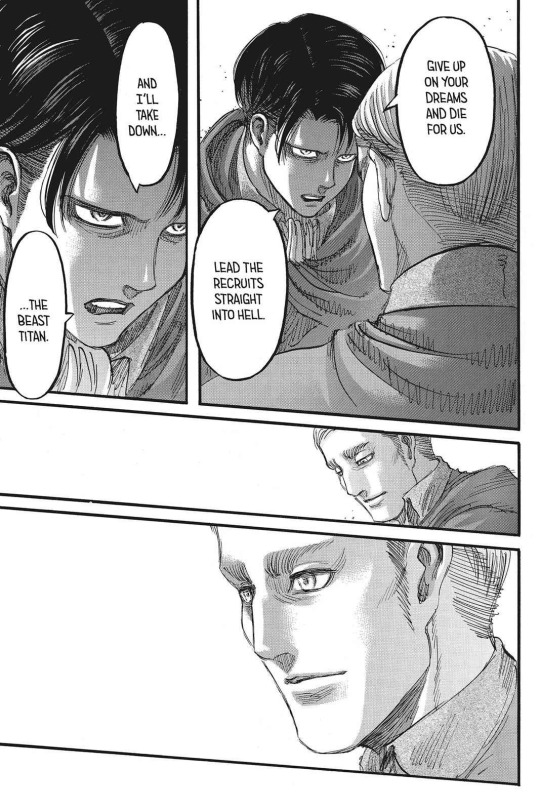
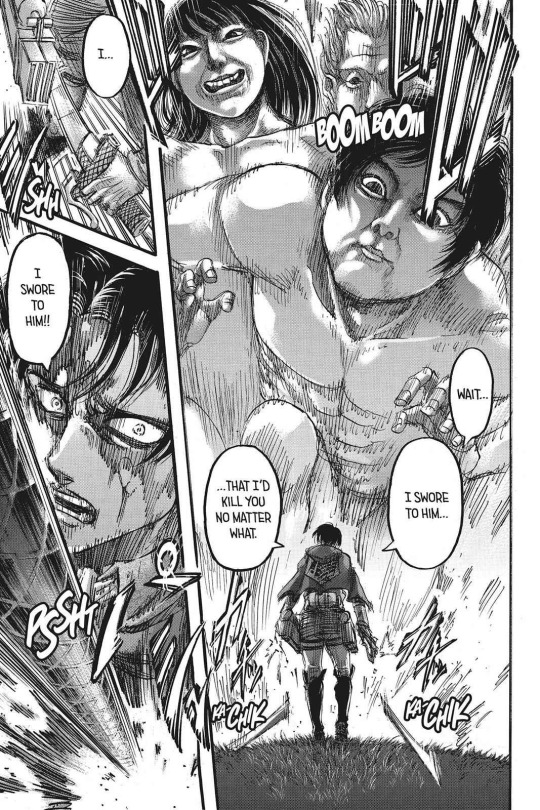
But then we enter the final arc. If Levi was really a mindless, revenge-seeking machine people ought him to be, if killing Zeke was just all in the name of revenge, then he would have had no hesitation to kill him back in the forest. Let me remind you, Zeke had turned all of his subordinates into titans and forced him to slaughter every single one of them. But despite that, despite feeling incredible loss and hatred, Levi still didn’t kill him. Why? Because he believed in the secret plan he had. Why? Because they all believed that was what was best for Eldia and because it was what was seemingly going to help free their race. He didn’t kill Zeke yet because that was what he believed to be best for humanity. In the end, no matter how you look at it, he was looking at the bigger picture. Yes, he still wanted to kill Zeke to satisfy his promise, but he was willing to see to it that his death would be through him getting eaten by a titan of their own.
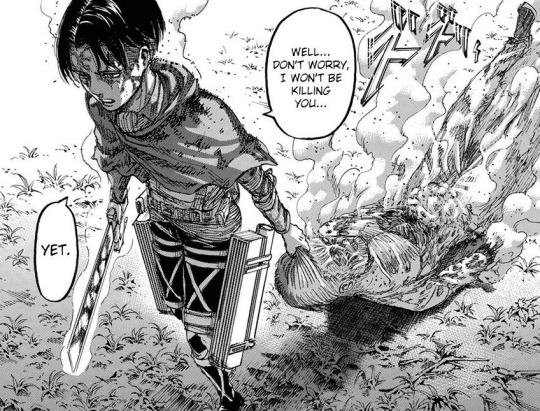
And then we come to the Alliance. His objective is to still kill Zeke, yes, but killing Zeke aligns with the interest of the Marleyans and is potentially the key to stopping the rumbling. And of course, he had just lost his subordinates. He has to give their deaths meaning as well, on top of all the others. But then Hange died too, and more than anything their final wish was to stop the rumbling. So I’m going to reiterate this for the nth time: the promise has always been about saving humanity and giving meaning to his comrades’ deaths. Chapter 136 also confirms this.
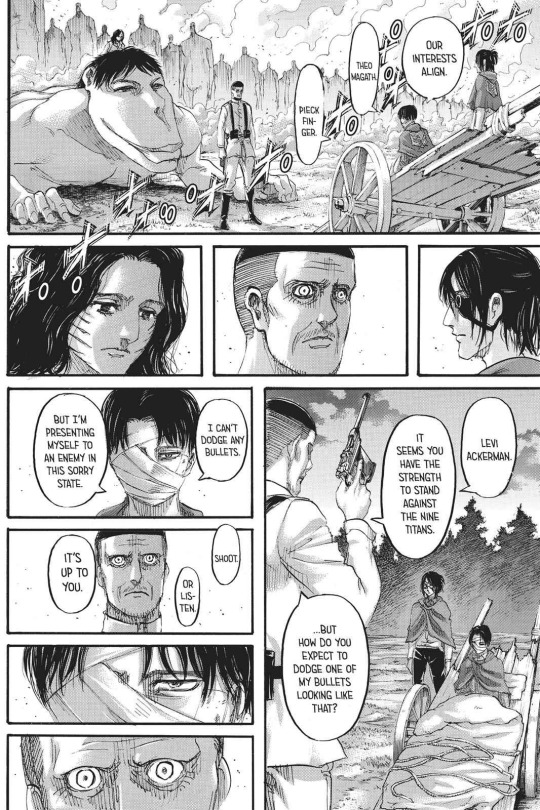
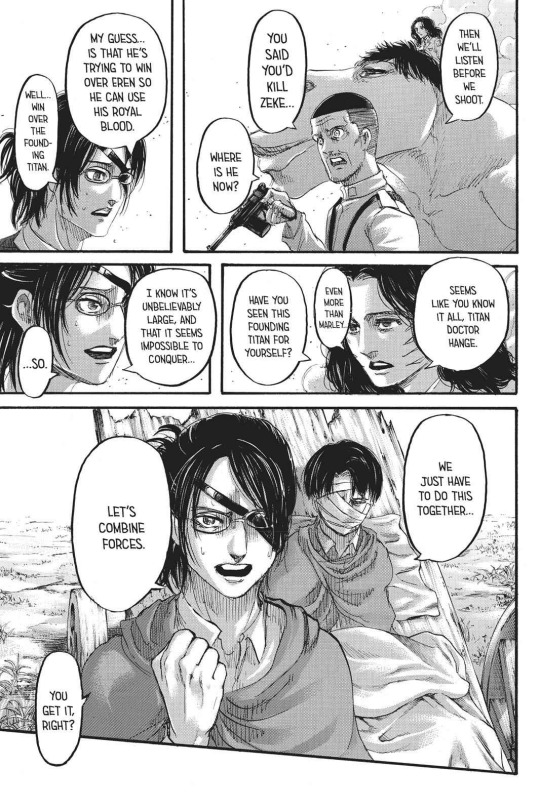
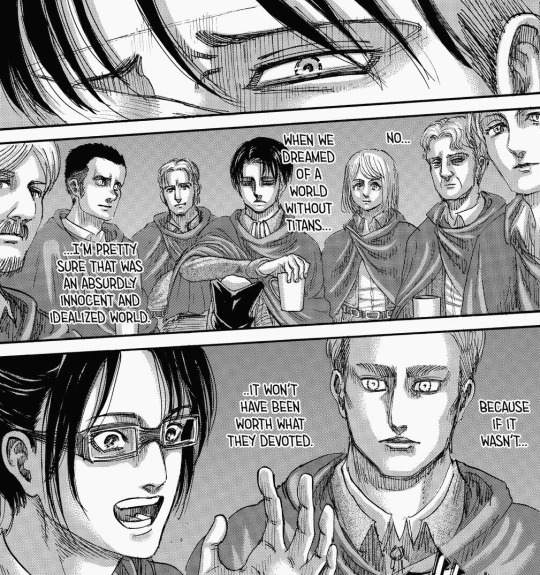
If keeping Zeke alive was the key to stopping the rumbling, however, then I’m sure Levi wouldn’t have killed him.
Now we have the actual part where he does what he’s been wishing for so long. Personally, I need more context for this and I hope we get some insight into his thoughts next chapter, but you can tell that killing Zeke didn’t give him the fulfillment he ought to have. He’s pained and distressed the entire time. Did he recognize Zeke's sacrifice? I can’t tell. But I think that this all points to the fact that he’s just tired.
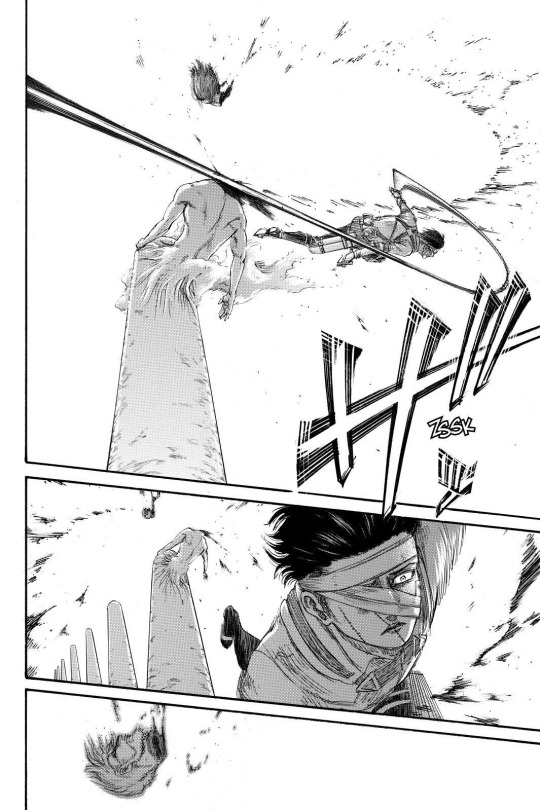
The entire time we see him in his crippled state — from Chapter 126 till now — he’s just, to put it quite plainly, dead inside.
Yelena pointed this out to him in Chapter 128, and you can just tell how tired he is. All his life has been about violence. He’s thrown into every single conflict, over and over again, and honestly, I’m having a hard time right now expressing my thoughts over this because my heart just hurts revisiting these chapters and thinking about it. He’s disassociated so much after Hange died and went as far as to say he’ll see them later. He’s just so done.

And I think that’s what he was thinking when he finally did it. He gave Zeke as much of a quick and painless death, despite all those years of wanting to savor his demise. Perhaps he didn’t realize how easy it would be. (Damn okay I thought it would be easier now to talk about this but I guess not, I’m just incredibly attached to Levi if you can’t tell.)
Regarding Zeke, well, I thought his last statement to be rather beautiful. How for so long he’s always thought of things somewhat in a black or white perspective. I love how Armin made him realize that life was all about those little moments, about those small things that give us joy in our everyday lives. He rose up and finally appreciated the beauty and simplicity of the day. And his interaction with Levi, saying how he wanted to meet him but he couldn’t say the same? How he just openly goes “Hey! I’m right here! You can kill me now, buddy!” like two old friends seeing each other again? I wouldn’t go as far as saying they were friends, but the light and comedic moments they always share amid their difficult and brutal relationship is something I truly appreciate and will miss.
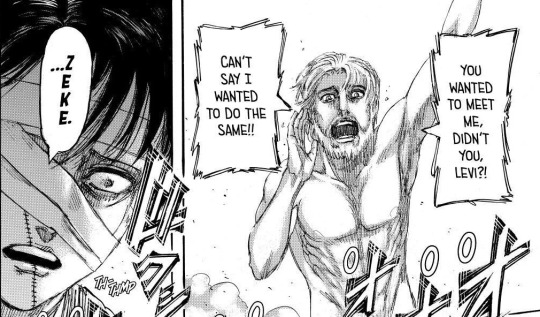
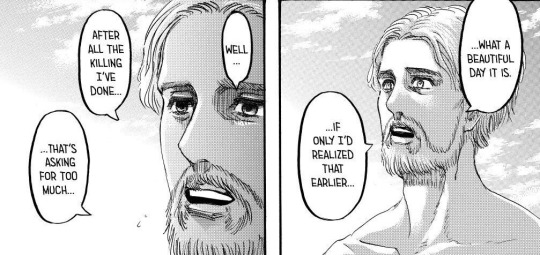
I really would love, however, if the situation with paths would be explained more. That whole dimension is so tricky and difficult to understand, and as much as I love reading other people’s theories, it sets me up for disappointment should my expectations not be met. And if I’m being completely honest, I also would have liked to see more of Zeke. He was out of commission for almost, what? A year? But then again, the manga timeline itself isn’t that long so I suppose it makes sense.
To wrap it up, Levi isn’t just a mindless tool for revenge. His promise to Erwin perfectly embodies his consistent intentions and principles as a character -- to help humanity and give meaning to his comrades’ deaths. His bond with Erwin is also something we can’t deny being there, and though it heavily influences him, it’s not what makes up his entire character. He’s incredibly tired of violence, which may be the reason why he looks the way he does in this chapter. Zeke is such an interesting and well-developed character and though I would have loved to have seen more of him, his epiphany and death were beautiful for me. Wouldn’t it be interesting if this was Levi’s last act of violence? Hopefully, the next chapter would give us more insight into his thoughts and explain things in regards to the bigger picture.
#i hope i was able to convey my thoughts properly#sometimes i feel like i'm all over the place#aot 137#snk 137#attack on titan#shingeki no kyojin#attack on titan spoilers#levi ackerman#levi#zeke#zeke yeager#zeke jaeger#my thoughts#ask box
91 notes
·
View notes
Text
Legend of Zelda: Breath of the Wild's Calamity Ganon is Part Fungus
A nonsense theory I've thought about a lot.
Before you continue, if you don't wanna be spoiled on BotW for any reason or are generally wigged out by mushrooms, spores, and fungi, you may wanna skip this whole thread. I will also not be touching on Age of Calamity here as I don't know the status of its canonicity to the main two BotW games.
Calamity Ganon is a mixture of two components
Ganon, the eternally reincarnating evil
Calamity, an evil fungus fueled by malice
The bosses are referred to as Blights. A blight is a plant killing infection usually but not exclusively caused by a fungus; molds, mildews, that kinda stuff.
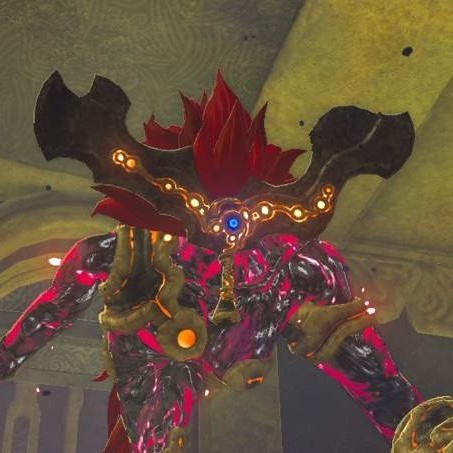
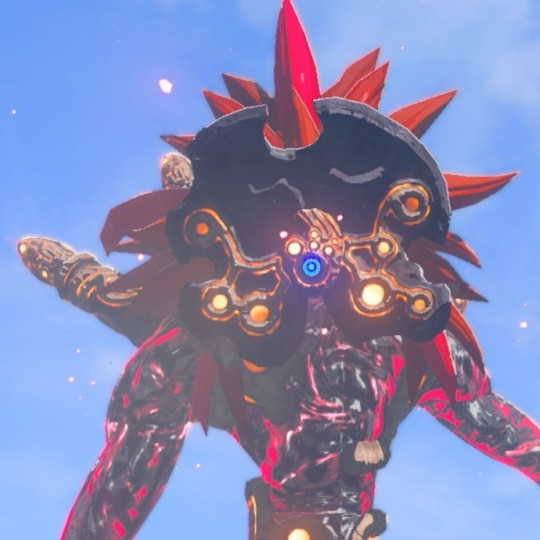


I could be thinking of the wrong organism entirely as I'm sure as hell not a mycologist but the faceplates of the blights kinda remind me of lichens, foliose lichens in particular. Blights don't have much to draw from for designs, so it makes sense to look at a variety of stuff within that grouping. But before we move on I want to specify something: lichens are not a single organism. They are a composite organism, a mutually beneficial symbiotic relationship between a fungus and an algae or cyanobacteria.
Since they're able to control the divine beasts it seems possible that they're based somewhat on cordyceps. Fungal infections in animals aren't usually called blights but they are possible. White Nose Syndrome in bats comes to mind. You can learn about more of them here: https://academic.oup.com/mmy/article/56/suppl_1/S165/4925968
Cordyceps usually affects arthropods, so I guess it's fitting that Calamity Ganon himself looks very insectoid. Where Dark Beast Ganon fits into this I can only do my best to guess till BotW2. You can learn about Ophiocordyceps unilateralis in particular here: https://api.nationalgeographic.com/distribution/public/amp/animals/article/cordyceps-zombie-fungus-takes-over-ants
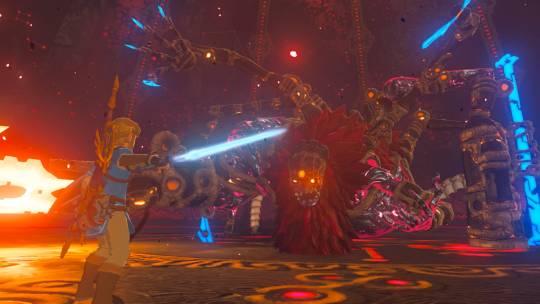
These bodies aren't all fungus most likely. It's very possible the blights are infected Sheikah mechanisms meant to help the Champions use their Beasts. That or they're twisted amalgamations made of some the Beasts' parts. Tough to say, but also implies the insect body may have been something else originally too.
I'm not sure what else I want to say about them as this time, but pools of Malice found around Hyrule and inside the divine beasts may in fact be unrefined masses of Calamity, the world's evilest mildew.

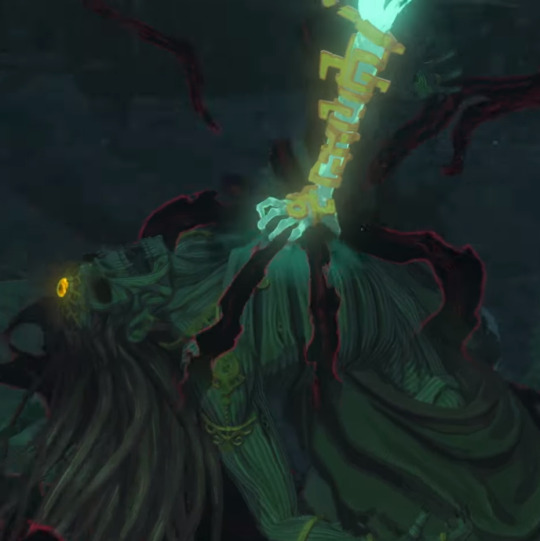
Until you bring out Dark Beast Ganon, Ganon never really has a body of his own. Or at the very least he's relying on the power of the Calamity very heavily. Up until you beat Calamity Ganon, Ganon is relying *heavily* on the Calamity's power to infect things. All Link really does is force him to get made enough to shed that and go full force with his own power. Of course given the first BotW2 trailer we know that's not his physical body, or at least not *all* of it.
What I'm trying to say is that much like a lichen, Calamity Ganon is a symbiotic fusion of Ganon the eternally reincarnated avatar of Demise, and Calamity the malicious magical MAYBE sentient fungus. Whether or not Calamity is related to Demise or where it came from is another story. For our purposes right now I just want to convince you that it exists.
I know that this all might seem like a huge reach but allow me to provide you with more potential hints of this.
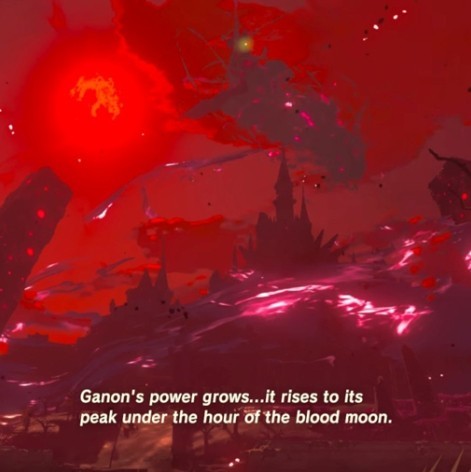
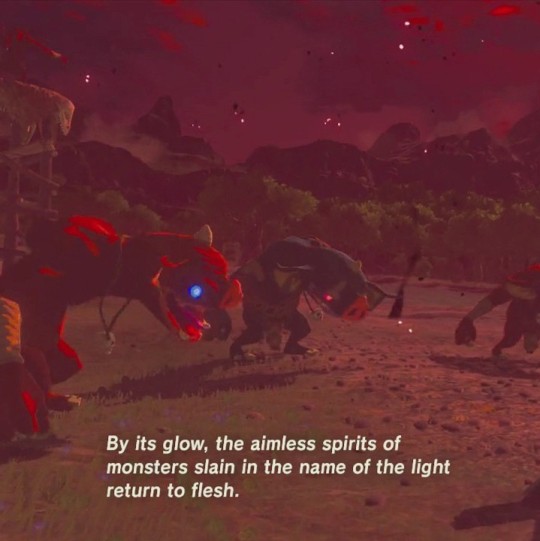
Blood moons. By our definition, a blood moon is a nickname for the moon during a complete and total lunar eclipse. Just like solar eclipses, lunar eclipses have heaps of folklore surrounding them and those stories are often very similar. They're usually seen as omens of dark things to come.
Most websites mention Chinese folklore about a dragon eating the sun and moon as a cause for eclipses, and the people making noise to make it go away, but then provide no more context after that. But better info is available on a myth from the Philippines that's very similar: the legend of Bakunawa the moon eating dragon. He is only repelled when the noise-making of the people alerts another god who drives him back and prevents him from eating the last of seven moons. It felt all too similar to how you see Calamity Ganon most of the game; as a dark misty serpent encircling the castle. He's even given part of the spotlight during the blood moon cutscene, roaring next to the moon as the sky is engulfed in a bloody red.
Though there was something better I could find relating to China about blood moons, from a collection of poetry called the Book of Odes. Two consecutive poems here mention both solar and lunar eclipses, lamenting what ills they may bring including death and famine. From the below translation they are listed as "Evil Portents, Evil Days" and "Further Lamentation, by and Underling in Court"
https://oll.libertyfund.org/title/confucius-the-shi-king-the-old-poetry-classic-of-the-chinese#preview
I realize that was a bit of a tangent, but I wanted to stress why blood moons in breath of the wild are so ominous, especially in a game that takes so much from legends and folklore around the world. But now onto reasoning this theory in conjunction with a game mechanic: the respawning of slain enemies during a blood moon. It's a practical necessity. You don't want to run out of enemies to fight.
My idea is that this event, in the game's universe, is either caused by or coincides with Calamity releasing it's spores to reproduce. The enemies are either being zombified by these spores in an endless cycle or being outright created. the Bokoblins, Moblins and Hinoxes are especially suspect as they have Ganon's porcine features (when he's in his more monstrous form shown in most games). The Moblins are the oldest of these and are Ganon's main infantry. The strength of the magic in these spores is strong, making them rise as flesh and bone. Their bones rise as the stal family of monsters. (The lizalfos also have a stal variant, but they're not as pig-like as the rest so I'm unsure of their role in that).
Because the enemies don't have the host that is Ganon and can only act as lesser copies they cannot grow to his or the primary Calamity's level of power. Ganon is extremely powerful on his own and this is the first time he's truly brought about apocalyptic levels of destruction, but without Ganon it's possible that the Calamity may not actually be that powerful at all.
I would like to circle back around here and go back to the way Calamity Ganon controls the Shiekah technology. I have yet to work out if that tech has any biological components. They certainly don't drop any. Most notable drops from Guardian enemies are the Ancient Core component used in crafting, whose flavor text refers to them as a crystal. It would point to them being inorganic in nature but with things like amber, pearls, and petrified wood and bones around it's hard to say. Regardless of that, there's obviously fantasy world magic logic at play and maybe that logic says mushrooms can infect robots

The game's story makes special importance of an ancient prophecy, a prophecy the Shiekah developed the technology to combat. It worked...the first time. But not the second. Why? Because the second time Ganon was prepared. Which suggests either:
Ganon did not have Calamity the first time he began his fated assault
Ganon had Calamity and was still learning how to use it's power
Ganon had ages to mull over this newfound power and develop it further. The Link we control in game was dealt a bad hand, coming into his destiny in a Hyrule that simply did not and probably could not foresee that factor.
BotW1 was only the beginning. Link and Zelda saved the day but they did not destroy the true source and so when they find Ganon's tomb, the evil has had time to recuperate and awaken once more. The real question is, are we going to be fighting and undead Calamity-fueled zombie Ganon, or a Calamity who's desperately clinging to Ganon's dessicated corpse and going full cordyceps to tap into his power?
We'll have to wait and see. This is all I have for now. I hope you enjoyed this chaotic breakdown I've mulled over for ages. Please take care.
#legend of zelda#legend of zegend#breath of the wild#breath of the wild 2#ganon#zelda#link#calamity ganon#game theory#theory#infodump#tears of the kingdom#yes I edited this to tag that#in my hehe era#calamity fungus theory#thought vomit journal
17 notes
·
View notes